Research and Analysis of Management Studies
VerifiedAdded on 2020/10/22
|18
|5341
|296
AI Summary
This assignment involves reviewing and analyzing various research papers and articles on management studies, including topics such as innovation capability, operational performance, and microinsurance thrift management. The provided sources cover a range of academic journals, conferences, and online resources, offering a comprehensive understanding of management principles and practices. The assignment is suitable for students pursuing higher education in business or related fields, seeking to gain insights into real-world applications of management concepts.
Contribute Materials
Your contribution can guide someone’s learning journey. Share your
documents today.
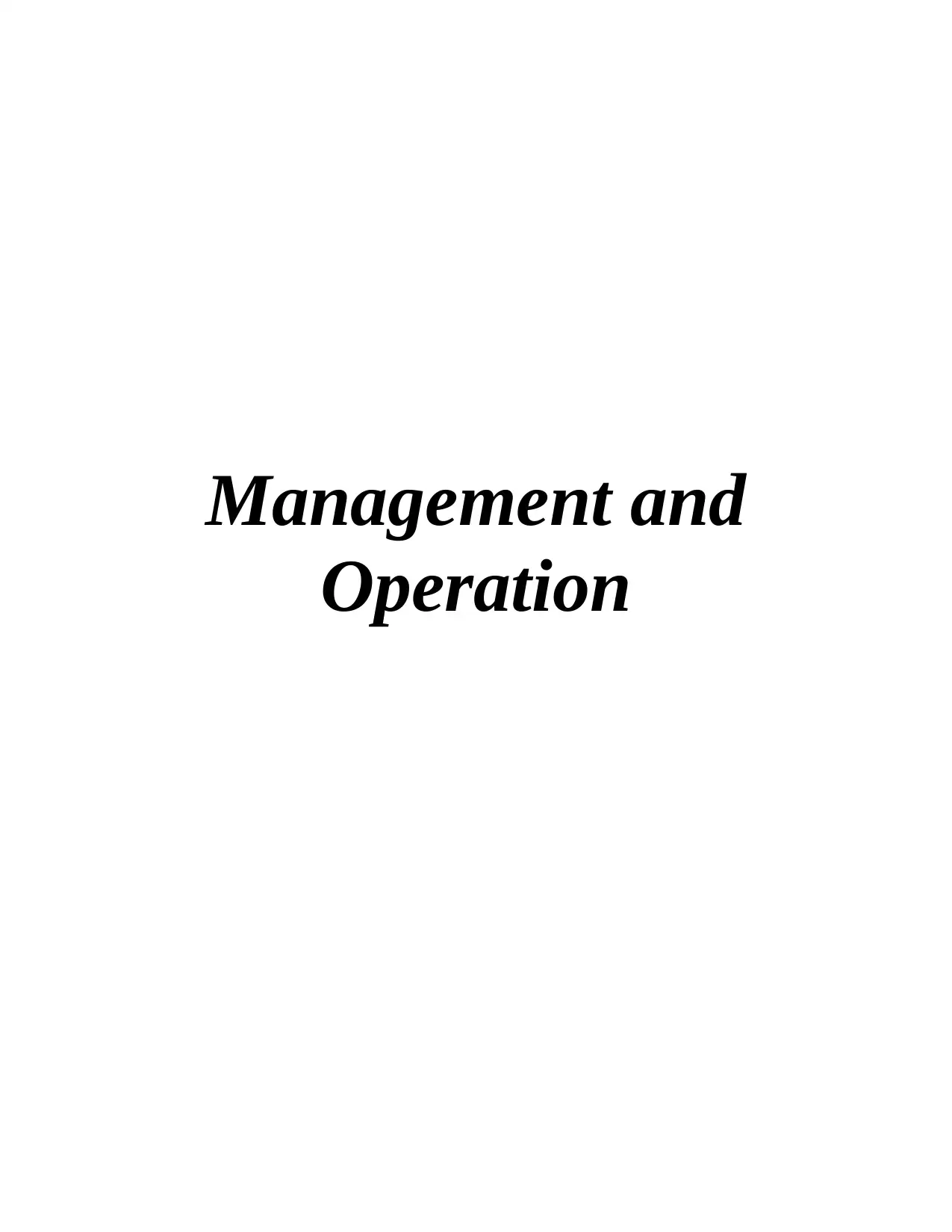
Management and
Operation
Operation
Secure Best Marks with AI Grader
Need help grading? Try our AI Grader for instant feedback on your assignments.
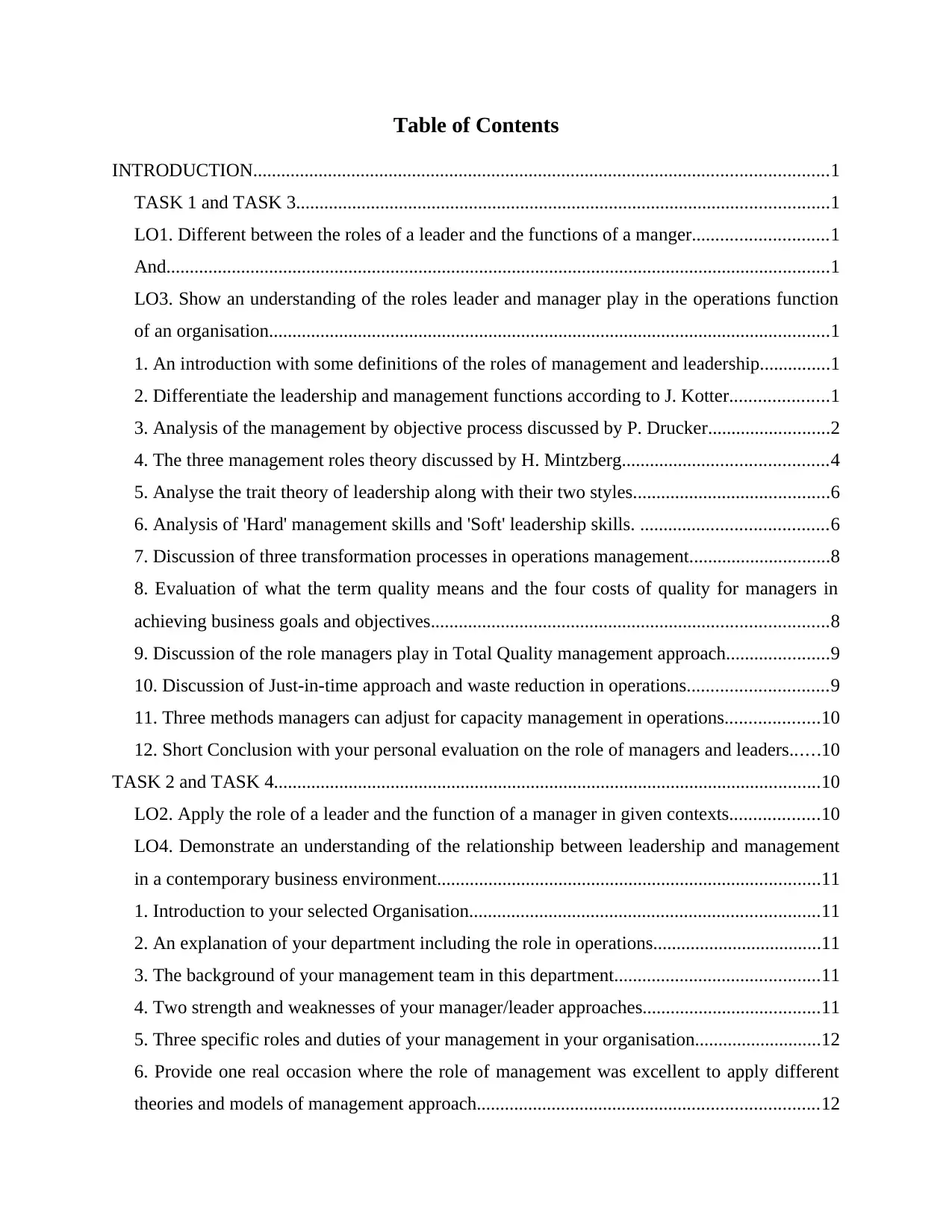
Table of Contents
INTRODUCTION...........................................................................................................................1
TASK 1 and TASK 3..................................................................................................................1
LO1. Different between the roles of a leader and the functions of a manger.............................1
And..............................................................................................................................................1
LO3. Show an understanding of the roles leader and manager play in the operations function
of an organisation........................................................................................................................1
1. An introduction with some definitions of the roles of management and leadership...............1
2. Differentiate the leadership and management functions according to J. Kotter.....................1
3. Analysis of the management by objective process discussed by P. Drucker..........................2
4. The three management roles theory discussed by H. Mintzberg............................................4
5. Analyse the trait theory of leadership along with their two styles..........................................6
6. Analysis of 'Hard' management skills and 'Soft' leadership skills. ........................................6
7. Discussion of three transformation processes in operations management..............................8
8. Evaluation of what the term quality means and the four costs of quality for managers in
achieving business goals and objectives.....................................................................................8
9. Discussion of the role managers play in Total Quality management approach......................9
10. Discussion of Just-in-time approach and waste reduction in operations..............................9
11. Three methods managers can adjust for capacity management in operations....................10
12. Short Conclusion with your personal evaluation on the role of managers and leaders......10
TASK 2 and TASK 4.....................................................................................................................10
LO2. Apply the role of a leader and the function of a manager in given contexts...................10
LO4. Demonstrate an understanding of the relationship between leadership and management
in a contemporary business environment..................................................................................11
1. Introduction to your selected Organisation...........................................................................11
2. An explanation of your department including the role in operations....................................11
3. The background of your management team in this department............................................11
4. Two strength and weaknesses of your manager/leader approaches......................................11
5. Three specific roles and duties of your management in your organisation...........................12
6. Provide one real occasion where the role of management was excellent to apply different
theories and models of management approach.........................................................................12
INTRODUCTION...........................................................................................................................1
TASK 1 and TASK 3..................................................................................................................1
LO1. Different between the roles of a leader and the functions of a manger.............................1
And..............................................................................................................................................1
LO3. Show an understanding of the roles leader and manager play in the operations function
of an organisation........................................................................................................................1
1. An introduction with some definitions of the roles of management and leadership...............1
2. Differentiate the leadership and management functions according to J. Kotter.....................1
3. Analysis of the management by objective process discussed by P. Drucker..........................2
4. The three management roles theory discussed by H. Mintzberg............................................4
5. Analyse the trait theory of leadership along with their two styles..........................................6
6. Analysis of 'Hard' management skills and 'Soft' leadership skills. ........................................6
7. Discussion of three transformation processes in operations management..............................8
8. Evaluation of what the term quality means and the four costs of quality for managers in
achieving business goals and objectives.....................................................................................8
9. Discussion of the role managers play in Total Quality management approach......................9
10. Discussion of Just-in-time approach and waste reduction in operations..............................9
11. Three methods managers can adjust for capacity management in operations....................10
12. Short Conclusion with your personal evaluation on the role of managers and leaders......10
TASK 2 and TASK 4.....................................................................................................................10
LO2. Apply the role of a leader and the function of a manager in given contexts...................10
LO4. Demonstrate an understanding of the relationship between leadership and management
in a contemporary business environment..................................................................................11
1. Introduction to your selected Organisation...........................................................................11
2. An explanation of your department including the role in operations....................................11
3. The background of your management team in this department............................................11
4. Two strength and weaknesses of your manager/leader approaches......................................11
5. Three specific roles and duties of your management in your organisation...........................12
6. Provide one real occasion where the role of management was excellent to apply different
theories and models of management approach.........................................................................12
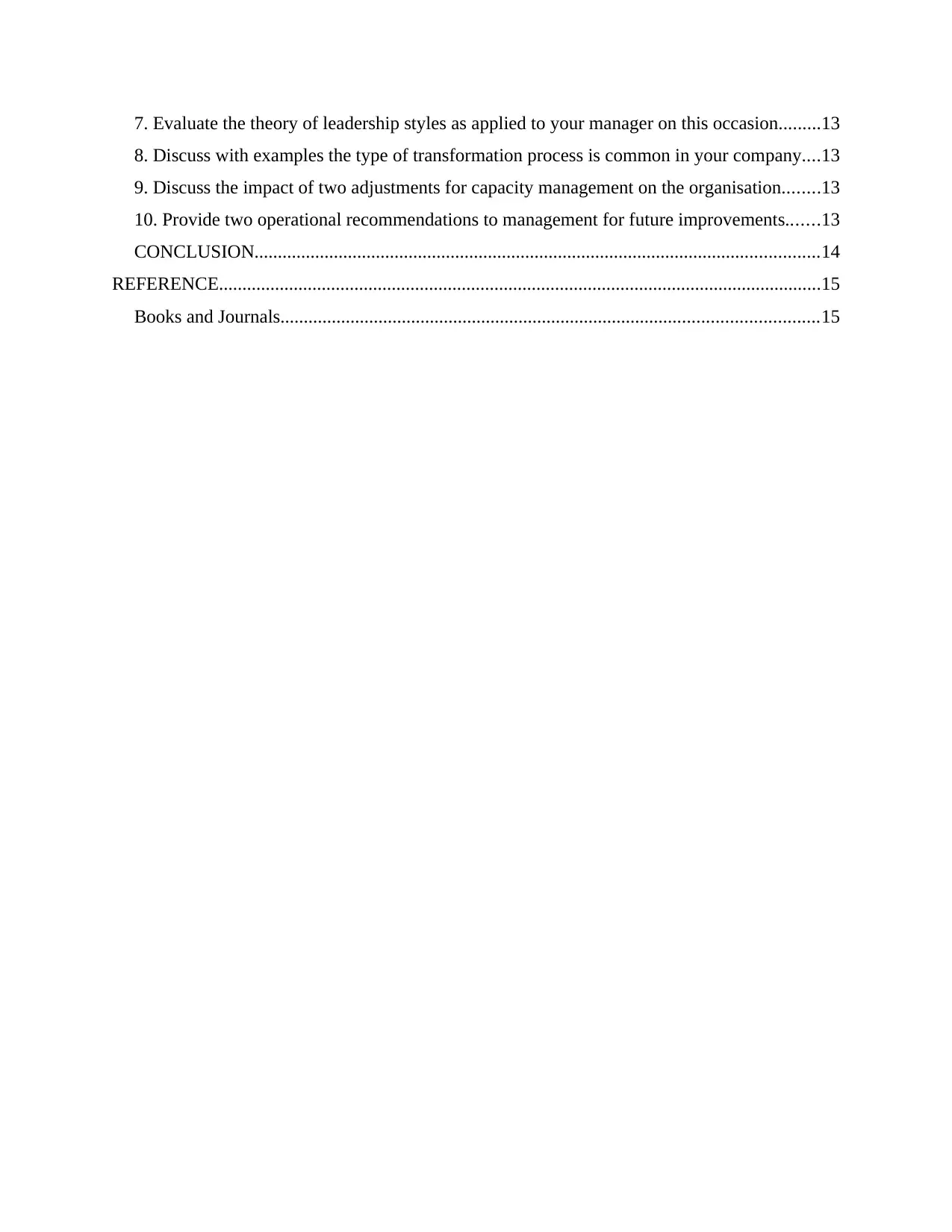
7. Evaluate the theory of leadership styles as applied to your manager on this occasion.........13
8. Discuss with examples the type of transformation process is common in your company....13
9. Discuss the impact of two adjustments for capacity management on the organisation........13
10. Provide two operational recommendations to management for future improvements.......13
CONCLUSION.........................................................................................................................14
REFERENCE.................................................................................................................................15
Books and Journals...................................................................................................................15
8. Discuss with examples the type of transformation process is common in your company....13
9. Discuss the impact of two adjustments for capacity management on the organisation........13
10. Provide two operational recommendations to management for future improvements.......13
CONCLUSION.........................................................................................................................14
REFERENCE.................................................................................................................................15
Books and Journals...................................................................................................................15
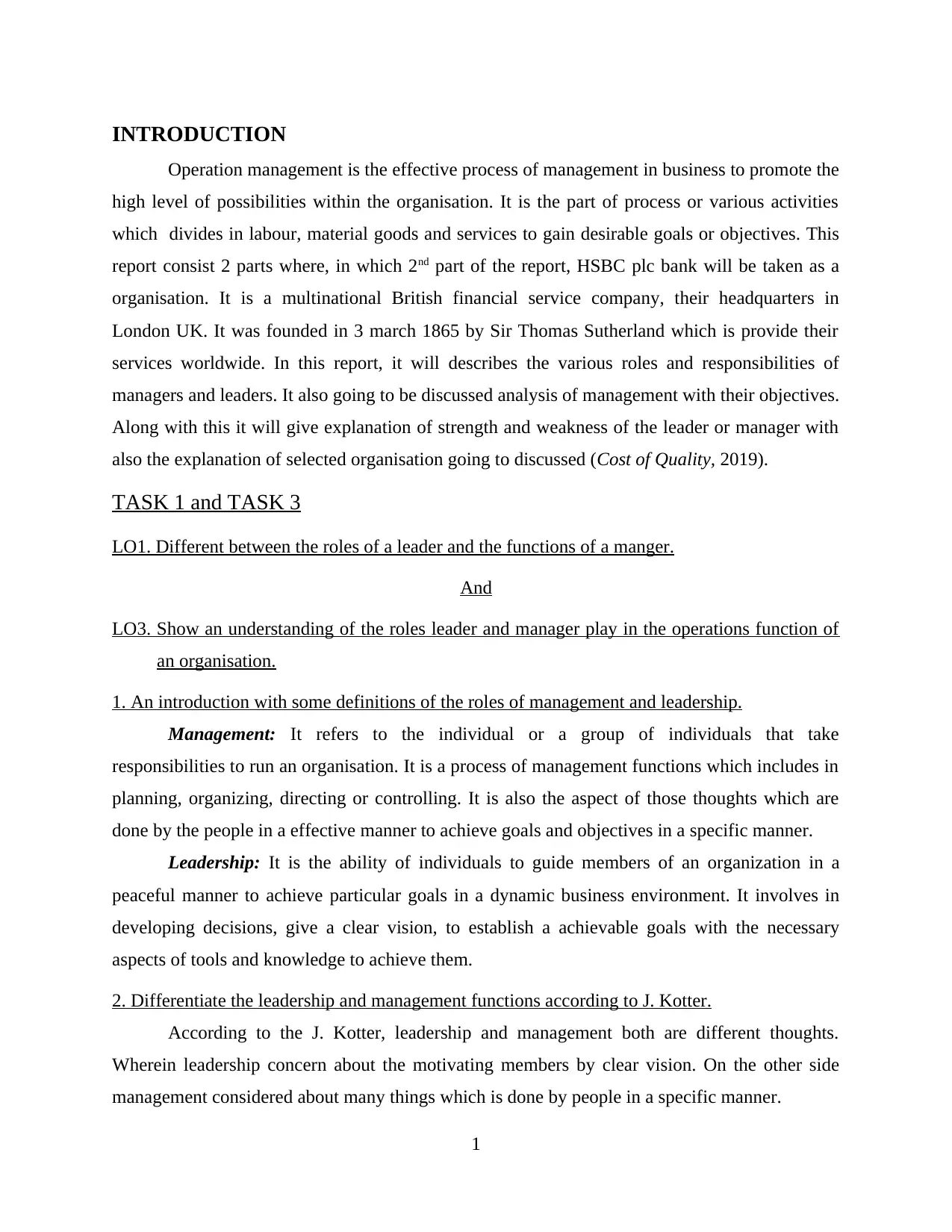
INTRODUCTION
Operation management is the effective process of management in business to promote the
high level of possibilities within the organisation. It is the part of process or various activities
which divides in labour, material goods and services to gain desirable goals or objectives. This
report consist 2 parts where, in which 2nd part of the report, HSBC plc bank will be taken as a
organisation. It is a multinational British financial service company, their headquarters in
London UK. It was founded in 3 march 1865 by Sir Thomas Sutherland which is provide their
services worldwide. In this report, it will describes the various roles and responsibilities of
managers and leaders. It also going to be discussed analysis of management with their objectives.
Along with this it will give explanation of strength and weakness of the leader or manager with
also the explanation of selected organisation going to discussed (Cost of Quality, 2019).
TASK 1 and TASK 3
LO1. Different between the roles of a leader and the functions of a manger.
And
LO3. Show an understanding of the roles leader and manager play in the operations function of
an organisation.
1. An introduction with some definitions of the roles of management and leadership.
Management: It refers to the individual or a group of individuals that take
responsibilities to run an organisation. It is a process of management functions which includes in
planning, organizing, directing or controlling. It is also the aspect of those thoughts which are
done by the people in a effective manner to achieve goals and objectives in a specific manner.
Leadership: It is the ability of individuals to guide members of an organization in a
peaceful manner to achieve particular goals in a dynamic business environment. It involves in
developing decisions, give a clear vision, to establish a achievable goals with the necessary
aspects of tools and knowledge to achieve them.
2. Differentiate the leadership and management functions according to J. Kotter.
According to the J. Kotter, leadership and management both are different thoughts.
Wherein leadership concern about the motivating members by clear vision. On the other side
management considered about many things which is done by people in a specific manner.
1
Operation management is the effective process of management in business to promote the
high level of possibilities within the organisation. It is the part of process or various activities
which divides in labour, material goods and services to gain desirable goals or objectives. This
report consist 2 parts where, in which 2nd part of the report, HSBC plc bank will be taken as a
organisation. It is a multinational British financial service company, their headquarters in
London UK. It was founded in 3 march 1865 by Sir Thomas Sutherland which is provide their
services worldwide. In this report, it will describes the various roles and responsibilities of
managers and leaders. It also going to be discussed analysis of management with their objectives.
Along with this it will give explanation of strength and weakness of the leader or manager with
also the explanation of selected organisation going to discussed (Cost of Quality, 2019).
TASK 1 and TASK 3
LO1. Different between the roles of a leader and the functions of a manger.
And
LO3. Show an understanding of the roles leader and manager play in the operations function of
an organisation.
1. An introduction with some definitions of the roles of management and leadership.
Management: It refers to the individual or a group of individuals that take
responsibilities to run an organisation. It is a process of management functions which includes in
planning, organizing, directing or controlling. It is also the aspect of those thoughts which are
done by the people in a effective manner to achieve goals and objectives in a specific manner.
Leadership: It is the ability of individuals to guide members of an organization in a
peaceful manner to achieve particular goals in a dynamic business environment. It involves in
developing decisions, give a clear vision, to establish a achievable goals with the necessary
aspects of tools and knowledge to achieve them.
2. Differentiate the leadership and management functions according to J. Kotter.
According to the J. Kotter, leadership and management both are different thoughts.
Wherein leadership concern about the motivating members by clear vision. On the other side
management considered about many things which is done by people in a specific manner.
1
Secure Best Marks with AI Grader
Need help grading? Try our AI Grader for instant feedback on your assignments.
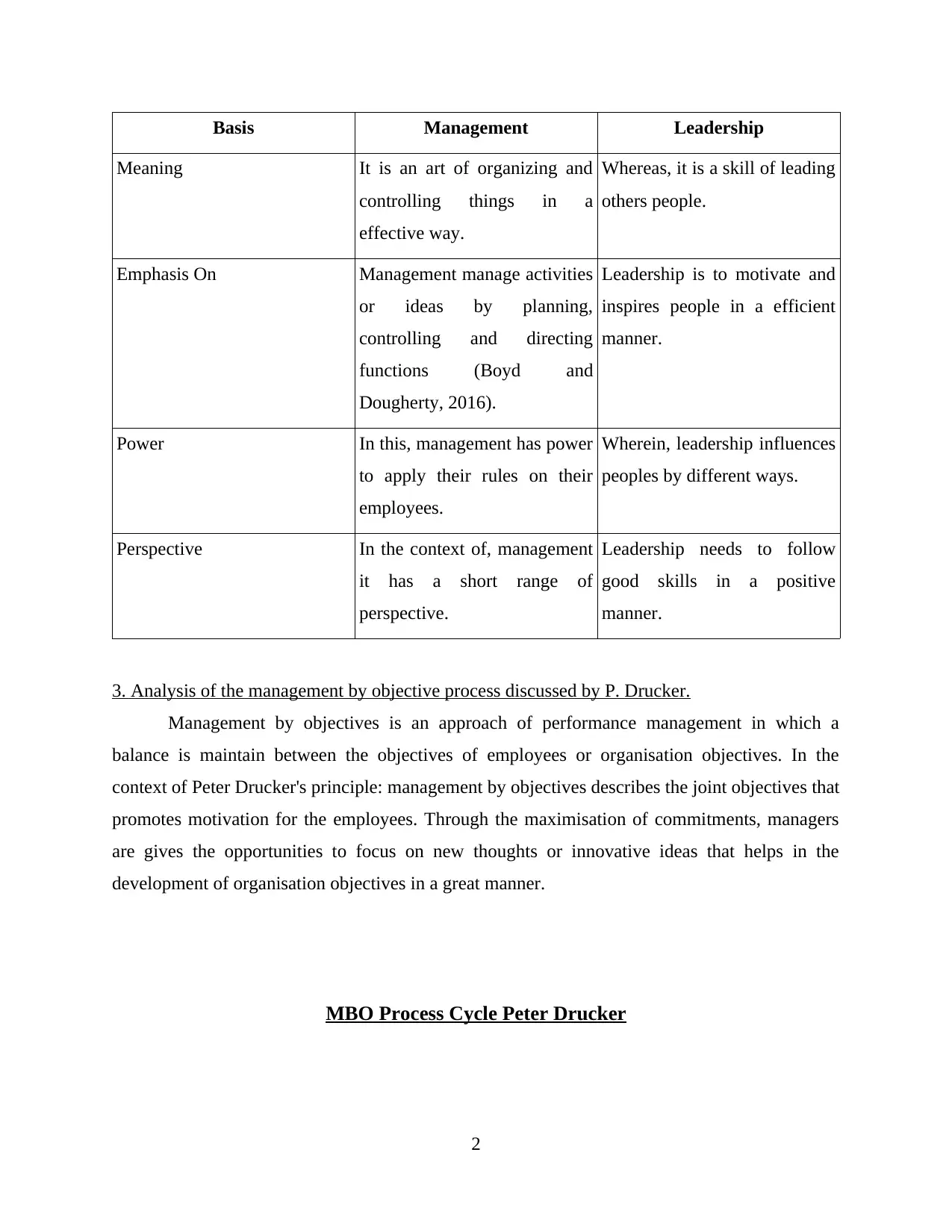
Basis Management Leadership
Meaning It is an art of organizing and
controlling things in a
effective way.
Whereas, it is a skill of leading
others people.
Emphasis On Management manage activities
or ideas by planning,
controlling and directing
functions (Boyd and
Dougherty, 2016).
Leadership is to motivate and
inspires people in a efficient
manner.
Power In this, management has power
to apply their rules on their
employees.
Wherein, leadership influences
peoples by different ways.
Perspective In the context of, management
it has a short range of
perspective.
Leadership needs to follow
good skills in a positive
manner.
3. Analysis of the management by objective process discussed by P. Drucker.
Management by objectives is an approach of performance management in which a
balance is maintain between the objectives of employees or organisation objectives. In the
context of Peter Drucker's principle: management by objectives describes the joint objectives that
promotes motivation for the employees. Through the maximisation of commitments, managers
are gives the opportunities to focus on new thoughts or innovative ideas that helps in the
development of organisation objectives in a great manner.
MBO Process Cycle Peter Drucker
2
Meaning It is an art of organizing and
controlling things in a
effective way.
Whereas, it is a skill of leading
others people.
Emphasis On Management manage activities
or ideas by planning,
controlling and directing
functions (Boyd and
Dougherty, 2016).
Leadership is to motivate and
inspires people in a efficient
manner.
Power In this, management has power
to apply their rules on their
employees.
Wherein, leadership influences
peoples by different ways.
Perspective In the context of, management
it has a short range of
perspective.
Leadership needs to follow
good skills in a positive
manner.
3. Analysis of the management by objective process discussed by P. Drucker.
Management by objectives is an approach of performance management in which a
balance is maintain between the objectives of employees or organisation objectives. In the
context of Peter Drucker's principle: management by objectives describes the joint objectives that
promotes motivation for the employees. Through the maximisation of commitments, managers
are gives the opportunities to focus on new thoughts or innovative ideas that helps in the
development of organisation objectives in a great manner.
MBO Process Cycle Peter Drucker
2
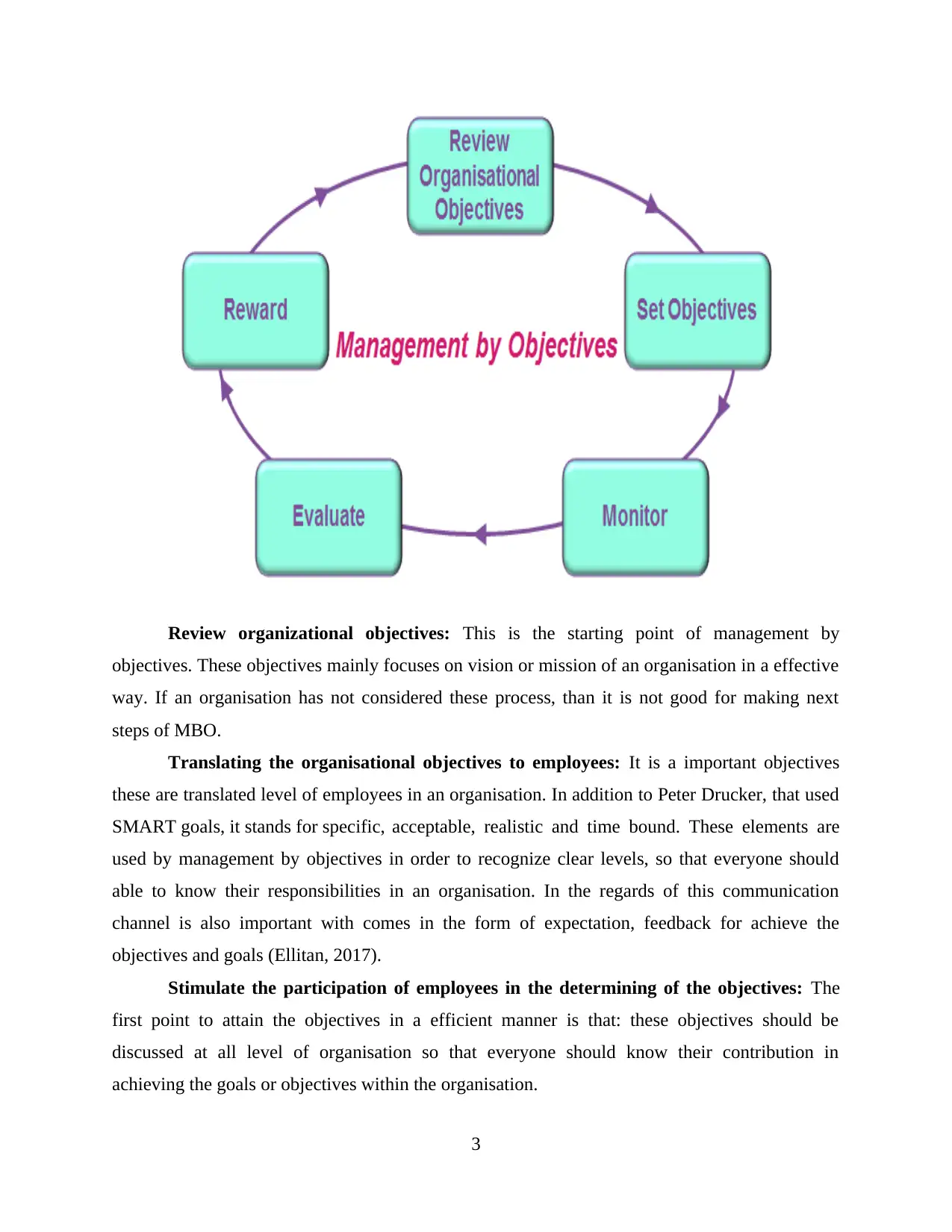
Review organizational objectives: This is the starting point of management by
objectives. These objectives mainly focuses on vision or mission of an organisation in a effective
way. If an organisation has not considered these process, than it is not good for making next
steps of MBO.
Translating the organisational objectives to employees: It is a important objectives
these are translated level of employees in an organisation. In addition to Peter Drucker, that used
SMART goals, it stands for specific, acceptable, realistic and time bound. These elements are
used by management by objectives in order to recognize clear levels, so that everyone should
able to know their responsibilities in an organisation. In the regards of this communication
channel is also important with comes in the form of expectation, feedback for achieve the
objectives and goals (Ellitan, 2017).
Stimulate the participation of employees in the determining of the objectives: The
first point to attain the objectives in a efficient manner is that: these objectives should be
discussed at all level of organisation so that everyone should know their contribution in
achieving the goals or objectives within the organisation.
3
objectives. These objectives mainly focuses on vision or mission of an organisation in a effective
way. If an organisation has not considered these process, than it is not good for making next
steps of MBO.
Translating the organisational objectives to employees: It is a important objectives
these are translated level of employees in an organisation. In addition to Peter Drucker, that used
SMART goals, it stands for specific, acceptable, realistic and time bound. These elements are
used by management by objectives in order to recognize clear levels, so that everyone should
able to know their responsibilities in an organisation. In the regards of this communication
channel is also important with comes in the form of expectation, feedback for achieve the
objectives and goals (Ellitan, 2017).
Stimulate the participation of employees in the determining of the objectives: The
first point to attain the objectives in a efficient manner is that: these objectives should be
discussed at all level of organisation so that everyone should know their contribution in
achieving the goals or objectives within the organisation.
3
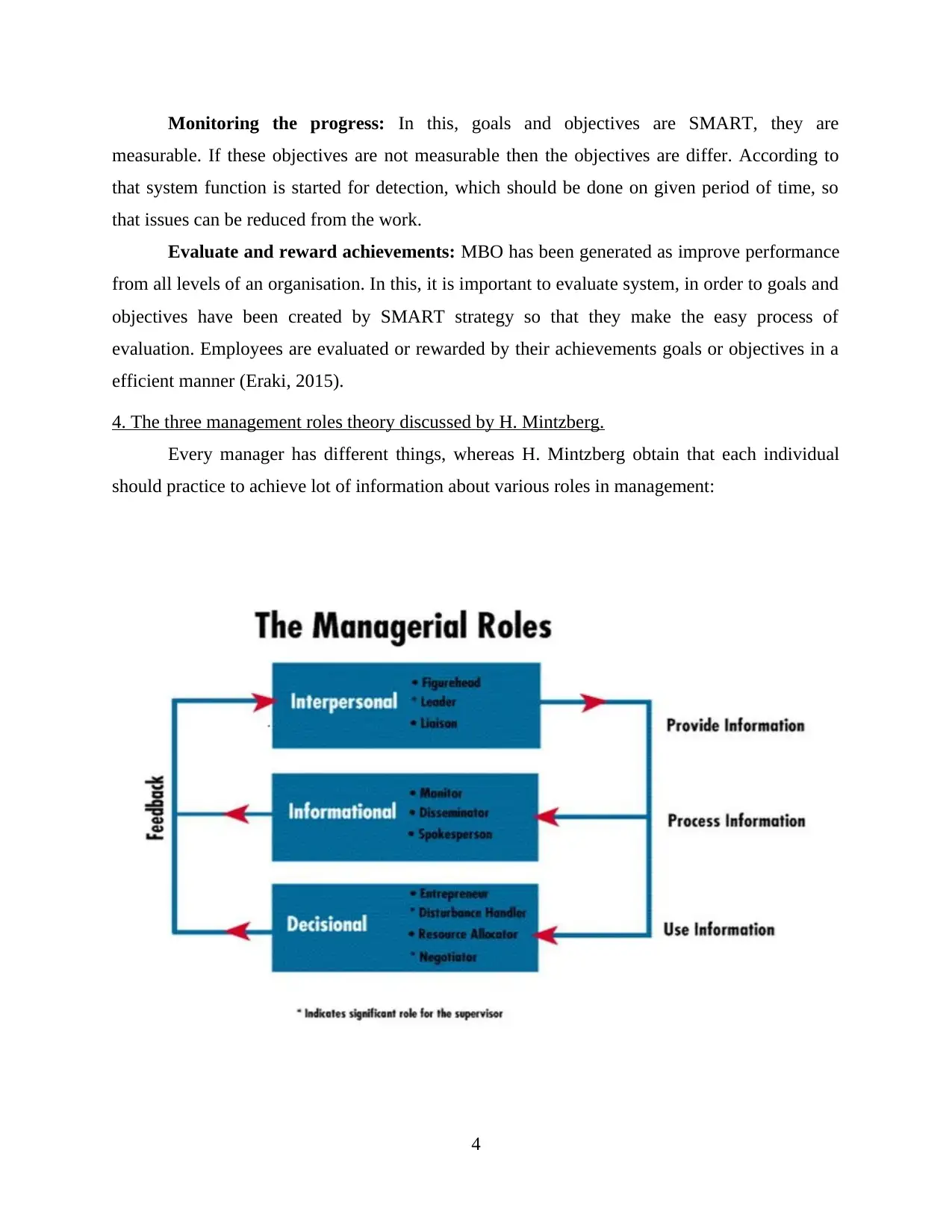
Monitoring the progress: In this, goals and objectives are SMART, they are
measurable. If these objectives are not measurable then the objectives are differ. According to
that system function is started for detection, which should be done on given period of time, so
that issues can be reduced from the work.
Evaluate and reward achievements: MBO has been generated as improve performance
from all levels of an organisation. In this, it is important to evaluate system, in order to goals and
objectives have been created by SMART strategy so that they make the easy process of
evaluation. Employees are evaluated or rewarded by their achievements goals or objectives in a
efficient manner (Eraki, 2015).
4. The three management roles theory discussed by H. Mintzberg.
Every manager has different things, whereas H. Mintzberg obtain that each individual
should practice to achieve lot of information about various roles in management:
4
measurable. If these objectives are not measurable then the objectives are differ. According to
that system function is started for detection, which should be done on given period of time, so
that issues can be reduced from the work.
Evaluate and reward achievements: MBO has been generated as improve performance
from all levels of an organisation. In this, it is important to evaluate system, in order to goals and
objectives have been created by SMART strategy so that they make the easy process of
evaluation. Employees are evaluated or rewarded by their achievements goals or objectives in a
efficient manner (Eraki, 2015).
4. The three management roles theory discussed by H. Mintzberg.
Every manager has different things, whereas H. Mintzberg obtain that each individual
should practice to achieve lot of information about various roles in management:
4
Paraphrase This Document
Need a fresh take? Get an instant paraphrase of this document with our AI Paraphraser
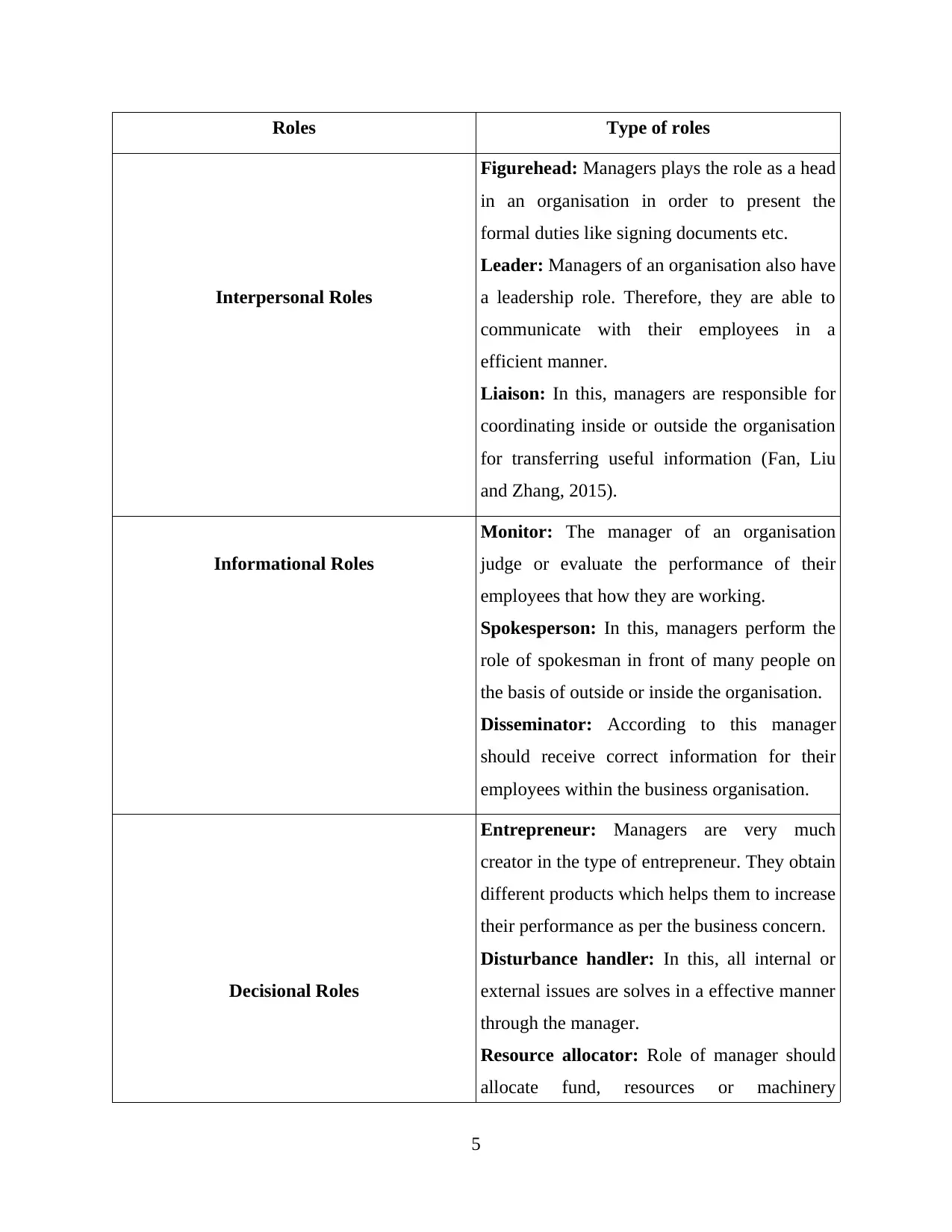
Roles Type of roles
Interpersonal Roles
Figurehead: Managers plays the role as a head
in an organisation in order to present the
formal duties like signing documents etc.
Leader: Managers of an organisation also have
a leadership role. Therefore, they are able to
communicate with their employees in a
efficient manner.
Liaison: In this, managers are responsible for
coordinating inside or outside the organisation
for transferring useful information (Fan, Liu
and Zhang, 2015).
Informational Roles
Monitor: The manager of an organisation
judge or evaluate the performance of their
employees that how they are working.
Spokesperson: In this, managers perform the
role of spokesman in front of many people on
the basis of outside or inside the organisation.
Disseminator: According to this manager
should receive correct information for their
employees within the business organisation.
Decisional Roles
Entrepreneur: Managers are very much
creator in the type of entrepreneur. They obtain
different products which helps them to increase
their performance as per the business concern.
Disturbance handler: In this, all internal or
external issues are solves in a effective manner
through the manager.
Resource allocator: Role of manager should
allocate fund, resources or machinery
5
Interpersonal Roles
Figurehead: Managers plays the role as a head
in an organisation in order to present the
formal duties like signing documents etc.
Leader: Managers of an organisation also have
a leadership role. Therefore, they are able to
communicate with their employees in a
efficient manner.
Liaison: In this, managers are responsible for
coordinating inside or outside the organisation
for transferring useful information (Fan, Liu
and Zhang, 2015).
Informational Roles
Monitor: The manager of an organisation
judge or evaluate the performance of their
employees that how they are working.
Spokesperson: In this, managers perform the
role of spokesman in front of many people on
the basis of outside or inside the organisation.
Disseminator: According to this manager
should receive correct information for their
employees within the business organisation.
Decisional Roles
Entrepreneur: Managers are very much
creator in the type of entrepreneur. They obtain
different products which helps them to increase
their performance as per the business concern.
Disturbance handler: In this, all internal or
external issues are solves in a effective manner
through the manager.
Resource allocator: Role of manager should
allocate fund, resources or machinery
5
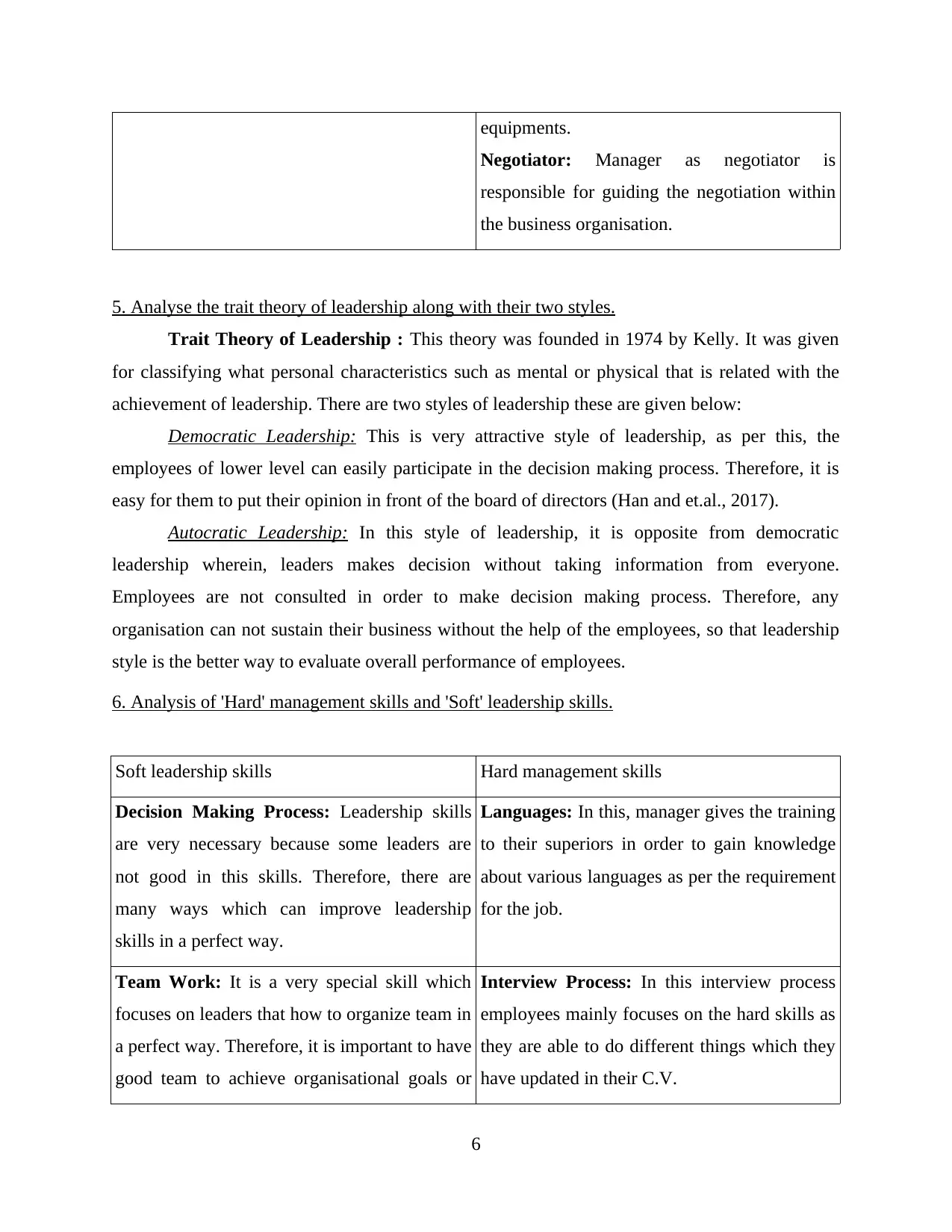
equipments.
Negotiator: Manager as negotiator is
responsible for guiding the negotiation within
the business organisation.
5. Analyse the trait theory of leadership along with their two styles.
Trait Theory of Leadership : This theory was founded in 1974 by Kelly. It was given
for classifying what personal characteristics such as mental or physical that is related with the
achievement of leadership. There are two styles of leadership these are given below:
Democratic Leadership: This is very attractive style of leadership, as per this, the
employees of lower level can easily participate in the decision making process. Therefore, it is
easy for them to put their opinion in front of the board of directors (Han and et.al., 2017).
Autocratic Leadership: In this style of leadership, it is opposite from democratic
leadership wherein, leaders makes decision without taking information from everyone.
Employees are not consulted in order to make decision making process. Therefore, any
organisation can not sustain their business without the help of the employees, so that leadership
style is the better way to evaluate overall performance of employees.
6. Analysis of 'Hard' management skills and 'Soft' leadership skills.
Soft leadership skills Hard management skills
Decision Making Process: Leadership skills
are very necessary because some leaders are
not good in this skills. Therefore, there are
many ways which can improve leadership
skills in a perfect way.
Languages: In this, manager gives the training
to their superiors in order to gain knowledge
about various languages as per the requirement
for the job.
Team Work: It is a very special skill which
focuses on leaders that how to organize team in
a perfect way. Therefore, it is important to have
good team to achieve organisational goals or
Interview Process: In this interview process
employees mainly focuses on the hard skills as
they are able to do different things which they
have updated in their C.V.
6
Negotiator: Manager as negotiator is
responsible for guiding the negotiation within
the business organisation.
5. Analyse the trait theory of leadership along with their two styles.
Trait Theory of Leadership : This theory was founded in 1974 by Kelly. It was given
for classifying what personal characteristics such as mental or physical that is related with the
achievement of leadership. There are two styles of leadership these are given below:
Democratic Leadership: This is very attractive style of leadership, as per this, the
employees of lower level can easily participate in the decision making process. Therefore, it is
easy for them to put their opinion in front of the board of directors (Han and et.al., 2017).
Autocratic Leadership: In this style of leadership, it is opposite from democratic
leadership wherein, leaders makes decision without taking information from everyone.
Employees are not consulted in order to make decision making process. Therefore, any
organisation can not sustain their business without the help of the employees, so that leadership
style is the better way to evaluate overall performance of employees.
6. Analysis of 'Hard' management skills and 'Soft' leadership skills.
Soft leadership skills Hard management skills
Decision Making Process: Leadership skills
are very necessary because some leaders are
not good in this skills. Therefore, there are
many ways which can improve leadership
skills in a perfect way.
Languages: In this, manager gives the training
to their superiors in order to gain knowledge
about various languages as per the requirement
for the job.
Team Work: It is a very special skill which
focuses on leaders that how to organize team in
a perfect way. Therefore, it is important to have
good team to achieve organisational goals or
Interview Process: In this interview process
employees mainly focuses on the hard skills as
they are able to do different things which they
have updated in their C.V.
6
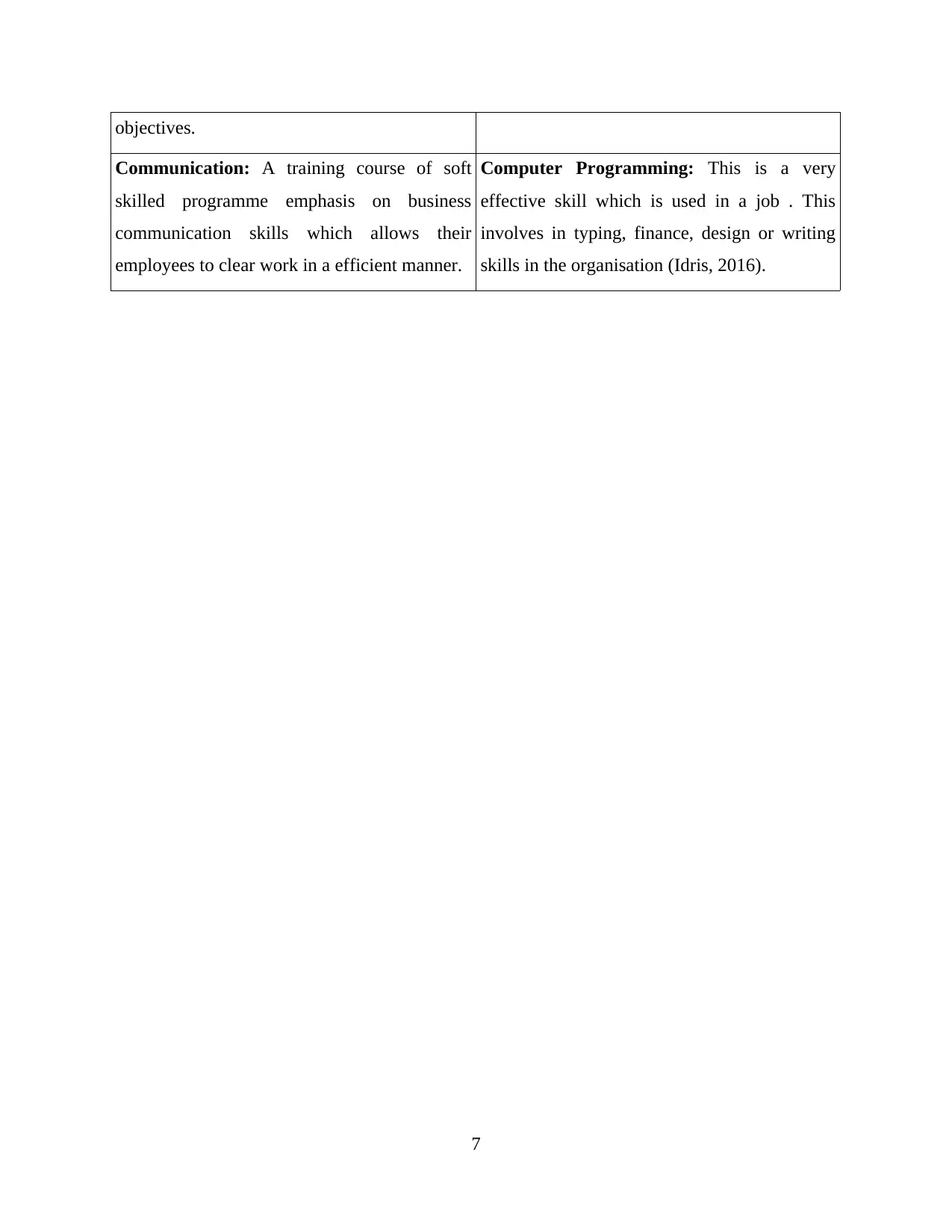
objectives.
Communication: A training course of soft
skilled programme emphasis on business
communication skills which allows their
employees to clear work in a efficient manner.
Computer Programming: This is a very
effective skill which is used in a job . This
involves in typing, finance, design or writing
skills in the organisation (Idris, 2016).
7
Communication: A training course of soft
skilled programme emphasis on business
communication skills which allows their
employees to clear work in a efficient manner.
Computer Programming: This is a very
effective skill which is used in a job . This
involves in typing, finance, design or writing
skills in the organisation (Idris, 2016).
7
Secure Best Marks with AI Grader
Need help grading? Try our AI Grader for instant feedback on your assignments.
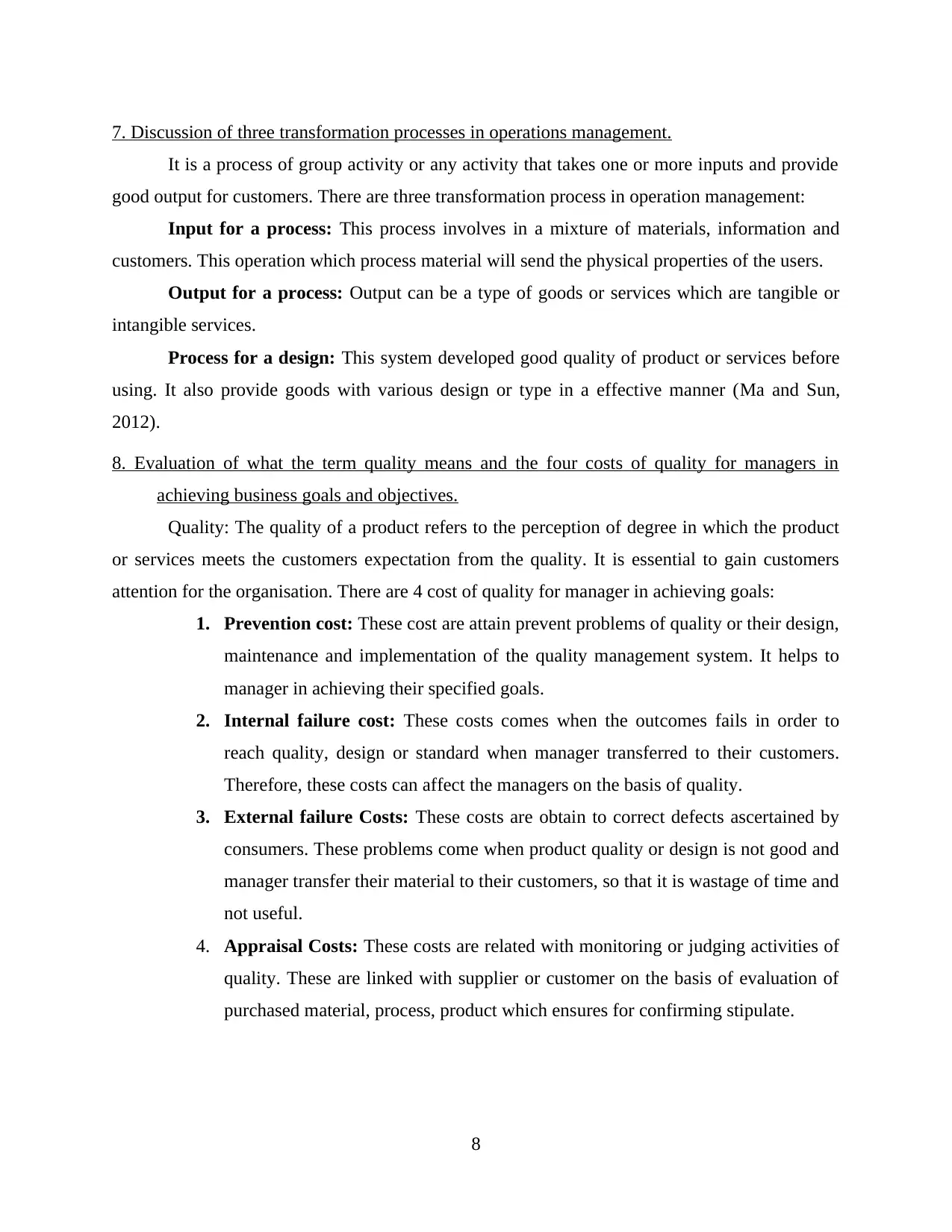
7. Discussion of three transformation processes in operations management.
It is a process of group activity or any activity that takes one or more inputs and provide
good output for customers. There are three transformation process in operation management:
Input for a process: This process involves in a mixture of materials, information and
customers. This operation which process material will send the physical properties of the users.
Output for a process: Output can be a type of goods or services which are tangible or
intangible services.
Process for a design: This system developed good quality of product or services before
using. It also provide goods with various design or type in a effective manner (Ma and Sun,
2012).
8. Evaluation of what the term quality means and the four costs of quality for managers in
achieving business goals and objectives.
Quality: The quality of a product refers to the perception of degree in which the product
or services meets the customers expectation from the quality. It is essential to gain customers
attention for the organisation. There are 4 cost of quality for manager in achieving goals:
1. Prevention cost: These cost are attain prevent problems of quality or their design,
maintenance and implementation of the quality management system. It helps to
manager in achieving their specified goals.
2. Internal failure cost: These costs comes when the outcomes fails in order to
reach quality, design or standard when manager transferred to their customers.
Therefore, these costs can affect the managers on the basis of quality.
3. External failure Costs: These costs are obtain to correct defects ascertained by
consumers. These problems come when product quality or design is not good and
manager transfer their material to their customers, so that it is wastage of time and
not useful.
4. Appraisal Costs: These costs are related with monitoring or judging activities of
quality. These are linked with supplier or customer on the basis of evaluation of
purchased material, process, product which ensures for confirming stipulate.
8
It is a process of group activity or any activity that takes one or more inputs and provide
good output for customers. There are three transformation process in operation management:
Input for a process: This process involves in a mixture of materials, information and
customers. This operation which process material will send the physical properties of the users.
Output for a process: Output can be a type of goods or services which are tangible or
intangible services.
Process for a design: This system developed good quality of product or services before
using. It also provide goods with various design or type in a effective manner (Ma and Sun,
2012).
8. Evaluation of what the term quality means and the four costs of quality for managers in
achieving business goals and objectives.
Quality: The quality of a product refers to the perception of degree in which the product
or services meets the customers expectation from the quality. It is essential to gain customers
attention for the organisation. There are 4 cost of quality for manager in achieving goals:
1. Prevention cost: These cost are attain prevent problems of quality or their design,
maintenance and implementation of the quality management system. It helps to
manager in achieving their specified goals.
2. Internal failure cost: These costs comes when the outcomes fails in order to
reach quality, design or standard when manager transferred to their customers.
Therefore, these costs can affect the managers on the basis of quality.
3. External failure Costs: These costs are obtain to correct defects ascertained by
consumers. These problems come when product quality or design is not good and
manager transfer their material to their customers, so that it is wastage of time and
not useful.
4. Appraisal Costs: These costs are related with monitoring or judging activities of
quality. These are linked with supplier or customer on the basis of evaluation of
purchased material, process, product which ensures for confirming stipulate.
8
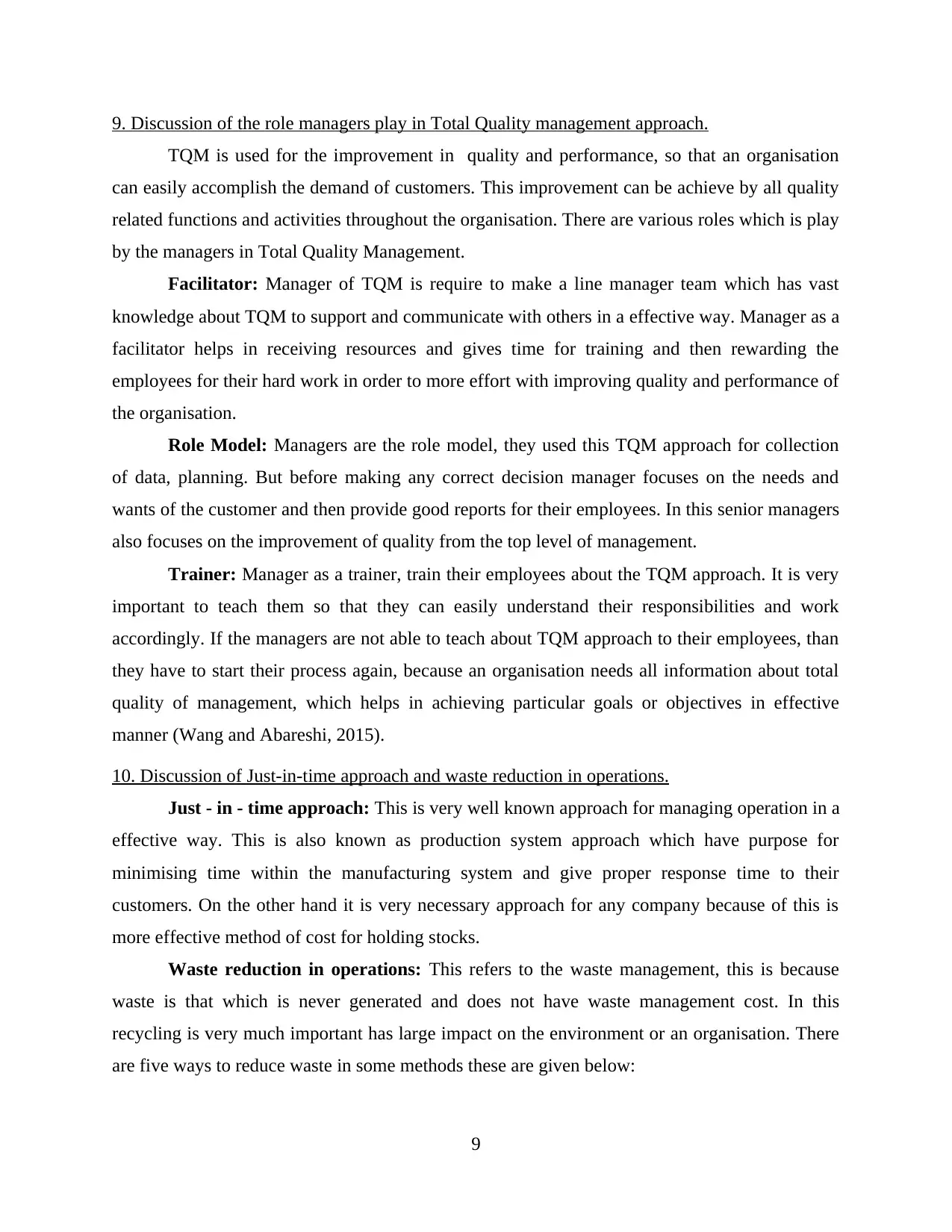
9. Discussion of the role managers play in Total Quality management approach.
TQM is used for the improvement in quality and performance, so that an organisation
can easily accomplish the demand of customers. This improvement can be achieve by all quality
related functions and activities throughout the organisation. There are various roles which is play
by the managers in Total Quality Management.
Facilitator: Manager of TQM is require to make a line manager team which has vast
knowledge about TQM to support and communicate with others in a effective way. Manager as a
facilitator helps in receiving resources and gives time for training and then rewarding the
employees for their hard work in order to more effort with improving quality and performance of
the organisation.
Role Model: Managers are the role model, they used this TQM approach for collection
of data, planning. But before making any correct decision manager focuses on the needs and
wants of the customer and then provide good reports for their employees. In this senior managers
also focuses on the improvement of quality from the top level of management.
Trainer: Manager as a trainer, train their employees about the TQM approach. It is very
important to teach them so that they can easily understand their responsibilities and work
accordingly. If the managers are not able to teach about TQM approach to their employees, than
they have to start their process again, because an organisation needs all information about total
quality of management, which helps in achieving particular goals or objectives in effective
manner (Wang and Abareshi, 2015).
10. Discussion of Just-in-time approach and waste reduction in operations.
Just - in - time approach: This is very well known approach for managing operation in a
effective way. This is also known as production system approach which have purpose for
minimising time within the manufacturing system and give proper response time to their
customers. On the other hand it is very necessary approach for any company because of this is
more effective method of cost for holding stocks.
Waste reduction in operations: This refers to the waste management, this is because
waste is that which is never generated and does not have waste management cost. In this
recycling is very much important has large impact on the environment or an organisation. There
are five ways to reduce waste in some methods these are given below:
9
TQM is used for the improvement in quality and performance, so that an organisation
can easily accomplish the demand of customers. This improvement can be achieve by all quality
related functions and activities throughout the organisation. There are various roles which is play
by the managers in Total Quality Management.
Facilitator: Manager of TQM is require to make a line manager team which has vast
knowledge about TQM to support and communicate with others in a effective way. Manager as a
facilitator helps in receiving resources and gives time for training and then rewarding the
employees for their hard work in order to more effort with improving quality and performance of
the organisation.
Role Model: Managers are the role model, they used this TQM approach for collection
of data, planning. But before making any correct decision manager focuses on the needs and
wants of the customer and then provide good reports for their employees. In this senior managers
also focuses on the improvement of quality from the top level of management.
Trainer: Manager as a trainer, train their employees about the TQM approach. It is very
important to teach them so that they can easily understand their responsibilities and work
accordingly. If the managers are not able to teach about TQM approach to their employees, than
they have to start their process again, because an organisation needs all information about total
quality of management, which helps in achieving particular goals or objectives in effective
manner (Wang and Abareshi, 2015).
10. Discussion of Just-in-time approach and waste reduction in operations.
Just - in - time approach: This is very well known approach for managing operation in a
effective way. This is also known as production system approach which have purpose for
minimising time within the manufacturing system and give proper response time to their
customers. On the other hand it is very necessary approach for any company because of this is
more effective method of cost for holding stocks.
Waste reduction in operations: This refers to the waste management, this is because
waste is that which is never generated and does not have waste management cost. In this
recycling is very much important has large impact on the environment or an organisation. There
are five ways to reduce waste in some methods these are given below:
9
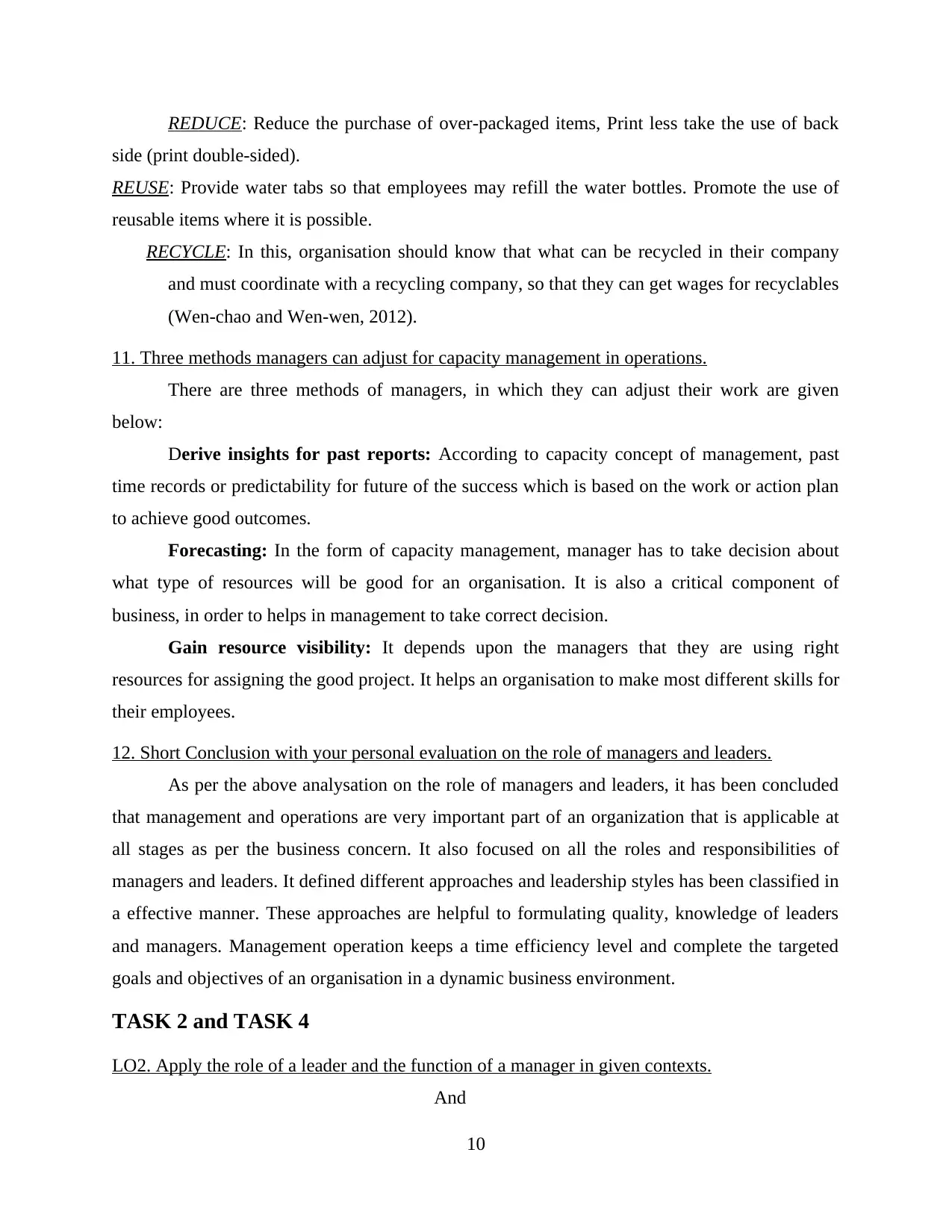
REDUCE: Reduce the purchase of over-packaged items, Print less take the use of back
side (print double-sided).
REUSE: Provide water tabs so that employees may refill the water bottles. Promote the use of
reusable items where it is possible.
RECYCLE: In this, organisation should know that what can be recycled in their company
and must coordinate with a recycling company, so that they can get wages for recyclables
(Wen-chao and Wen-wen, 2012).
11. Three methods managers can adjust for capacity management in operations.
There are three methods of managers, in which they can adjust their work are given
below:
Derive insights for past reports: According to capacity concept of management, past
time records or predictability for future of the success which is based on the work or action plan
to achieve good outcomes.
Forecasting: In the form of capacity management, manager has to take decision about
what type of resources will be good for an organisation. It is also a critical component of
business, in order to helps in management to take correct decision.
Gain resource visibility: It depends upon the managers that they are using right
resources for assigning the good project. It helps an organisation to make most different skills for
their employees.
12. Short Conclusion with your personal evaluation on the role of managers and leaders.
As per the above analysation on the role of managers and leaders, it has been concluded
that management and operations are very important part of an organization that is applicable at
all stages as per the business concern. It also focused on all the roles and responsibilities of
managers and leaders. It defined different approaches and leadership styles has been classified in
a effective manner. These approaches are helpful to formulating quality, knowledge of leaders
and managers. Management operation keeps a time efficiency level and complete the targeted
goals and objectives of an organisation in a dynamic business environment.
TASK 2 and TASK 4
LO2. Apply the role of a leader and the function of a manager in given contexts.
And
10
side (print double-sided).
REUSE: Provide water tabs so that employees may refill the water bottles. Promote the use of
reusable items where it is possible.
RECYCLE: In this, organisation should know that what can be recycled in their company
and must coordinate with a recycling company, so that they can get wages for recyclables
(Wen-chao and Wen-wen, 2012).
11. Three methods managers can adjust for capacity management in operations.
There are three methods of managers, in which they can adjust their work are given
below:
Derive insights for past reports: According to capacity concept of management, past
time records or predictability for future of the success which is based on the work or action plan
to achieve good outcomes.
Forecasting: In the form of capacity management, manager has to take decision about
what type of resources will be good for an organisation. It is also a critical component of
business, in order to helps in management to take correct decision.
Gain resource visibility: It depends upon the managers that they are using right
resources for assigning the good project. It helps an organisation to make most different skills for
their employees.
12. Short Conclusion with your personal evaluation on the role of managers and leaders.
As per the above analysation on the role of managers and leaders, it has been concluded
that management and operations are very important part of an organization that is applicable at
all stages as per the business concern. It also focused on all the roles and responsibilities of
managers and leaders. It defined different approaches and leadership styles has been classified in
a effective manner. These approaches are helpful to formulating quality, knowledge of leaders
and managers. Management operation keeps a time efficiency level and complete the targeted
goals and objectives of an organisation in a dynamic business environment.
TASK 2 and TASK 4
LO2. Apply the role of a leader and the function of a manager in given contexts.
And
10
Paraphrase This Document
Need a fresh take? Get an instant paraphrase of this document with our AI Paraphraser
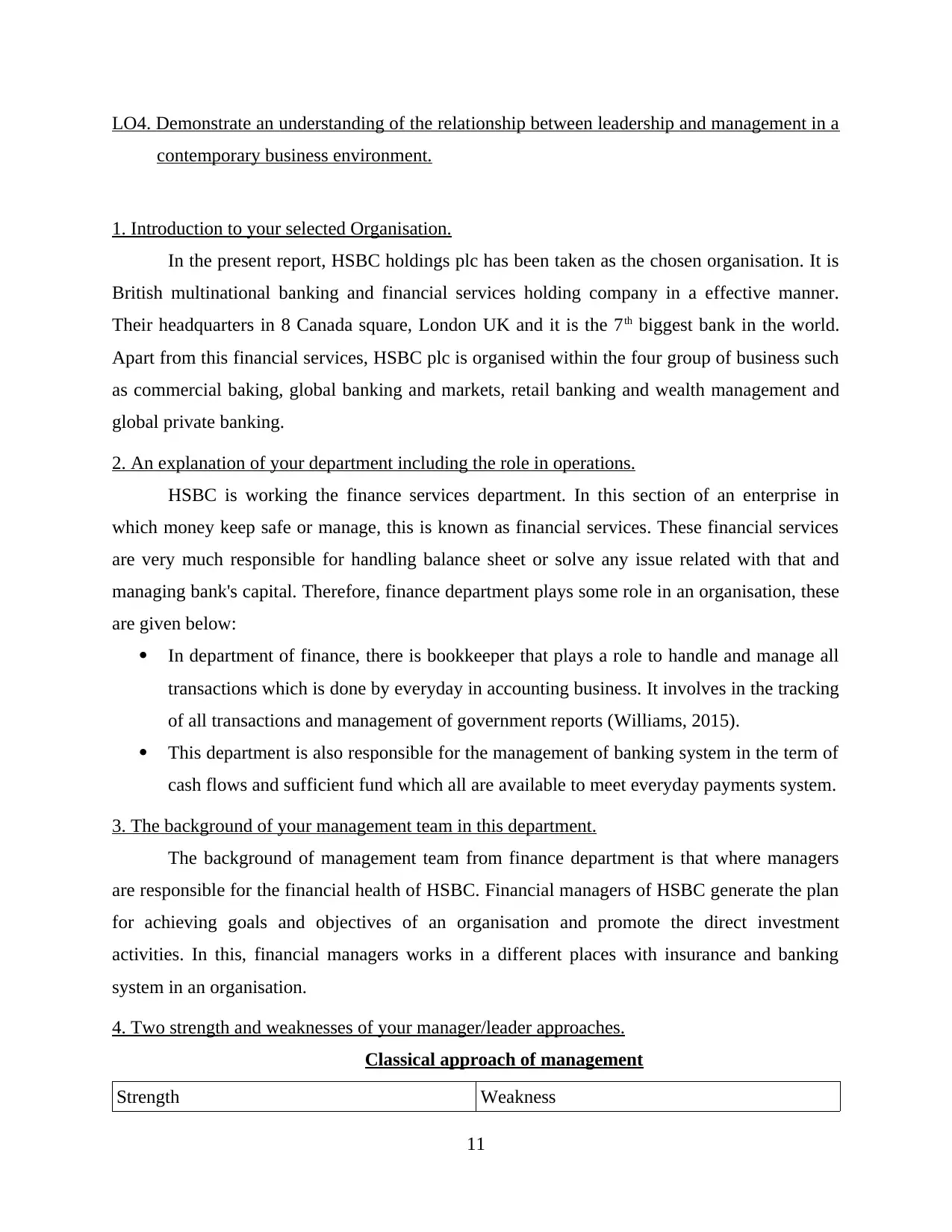
LO4. Demonstrate an understanding of the relationship between leadership and management in a
contemporary business environment.
1. Introduction to your selected Organisation.
In the present report, HSBC holdings plc has been taken as the chosen organisation. It is
British multinational banking and financial services holding company in a effective manner.
Their headquarters in 8 Canada square, London UK and it is the 7th biggest bank in the world.
Apart from this financial services, HSBC plc is organised within the four group of business such
as commercial baking, global banking and markets, retail banking and wealth management and
global private banking.
2. An explanation of your department including the role in operations.
HSBC is working the finance services department. In this section of an enterprise in
which money keep safe or manage, this is known as financial services. These financial services
are very much responsible for handling balance sheet or solve any issue related with that and
managing bank's capital. Therefore, finance department plays some role in an organisation, these
are given below:
In department of finance, there is bookkeeper that plays a role to handle and manage all
transactions which is done by everyday in accounting business. It involves in the tracking
of all transactions and management of government reports (Williams, 2015).
This department is also responsible for the management of banking system in the term of
cash flows and sufficient fund which all are available to meet everyday payments system.
3. The background of your management team in this department.
The background of management team from finance department is that where managers
are responsible for the financial health of HSBC. Financial managers of HSBC generate the plan
for achieving goals and objectives of an organisation and promote the direct investment
activities. In this, financial managers works in a different places with insurance and banking
system in an organisation.
4. Two strength and weaknesses of your manager/leader approaches.
Classical approach of management
Strength Weakness
11
contemporary business environment.
1. Introduction to your selected Organisation.
In the present report, HSBC holdings plc has been taken as the chosen organisation. It is
British multinational banking and financial services holding company in a effective manner.
Their headquarters in 8 Canada square, London UK and it is the 7th biggest bank in the world.
Apart from this financial services, HSBC plc is organised within the four group of business such
as commercial baking, global banking and markets, retail banking and wealth management and
global private banking.
2. An explanation of your department including the role in operations.
HSBC is working the finance services department. In this section of an enterprise in
which money keep safe or manage, this is known as financial services. These financial services
are very much responsible for handling balance sheet or solve any issue related with that and
managing bank's capital. Therefore, finance department plays some role in an organisation, these
are given below:
In department of finance, there is bookkeeper that plays a role to handle and manage all
transactions which is done by everyday in accounting business. It involves in the tracking
of all transactions and management of government reports (Williams, 2015).
This department is also responsible for the management of banking system in the term of
cash flows and sufficient fund which all are available to meet everyday payments system.
3. The background of your management team in this department.
The background of management team from finance department is that where managers
are responsible for the financial health of HSBC. Financial managers of HSBC generate the plan
for achieving goals and objectives of an organisation and promote the direct investment
activities. In this, financial managers works in a different places with insurance and banking
system in an organisation.
4. Two strength and weaknesses of your manager/leader approaches.
Classical approach of management
Strength Weakness
11
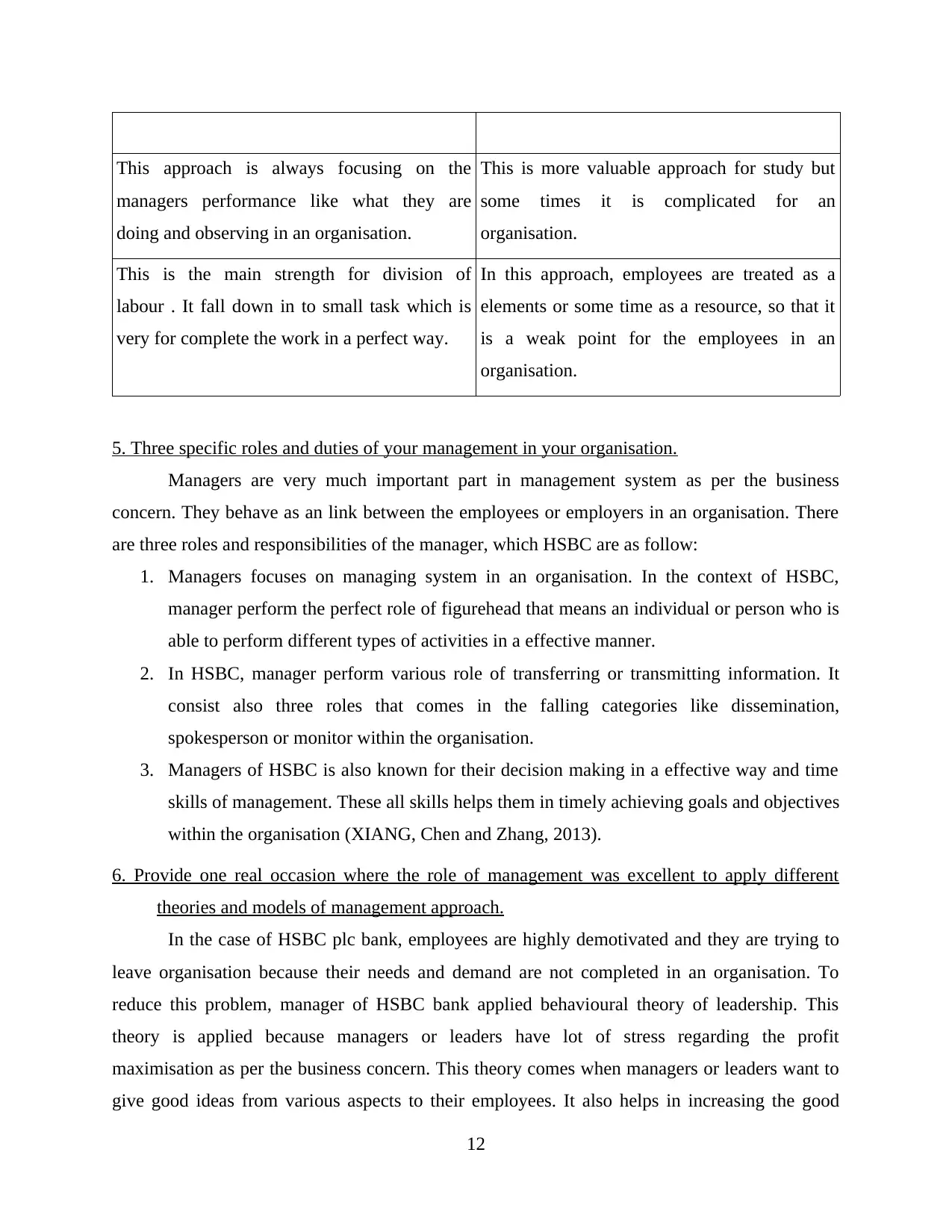
This approach is always focusing on the
managers performance like what they are
doing and observing in an organisation.
This is more valuable approach for study but
some times it is complicated for an
organisation.
This is the main strength for division of
labour . It fall down in to small task which is
very for complete the work in a perfect way.
In this approach, employees are treated as a
elements or some time as a resource, so that it
is a weak point for the employees in an
organisation.
5. Three specific roles and duties of your management in your organisation.
Managers are very much important part in management system as per the business
concern. They behave as an link between the employees or employers in an organisation. There
are three roles and responsibilities of the manager, which HSBC are as follow:
1. Managers focuses on managing system in an organisation. In the context of HSBC,
manager perform the perfect role of figurehead that means an individual or person who is
able to perform different types of activities in a effective manner.
2. In HSBC, manager perform various role of transferring or transmitting information. It
consist also three roles that comes in the falling categories like dissemination,
spokesperson or monitor within the organisation.
3. Managers of HSBC is also known for their decision making in a effective way and time
skills of management. These all skills helps them in timely achieving goals and objectives
within the organisation (XIANG, Chen and Zhang, 2013).
6. Provide one real occasion where the role of management was excellent to apply different
theories and models of management approach.
In the case of HSBC plc bank, employees are highly demotivated and they are trying to
leave organisation because their needs and demand are not completed in an organisation. To
reduce this problem, manager of HSBC bank applied behavioural theory of leadership. This
theory is applied because managers or leaders have lot of stress regarding the profit
maximisation as per the business concern. This theory comes when managers or leaders want to
give good ideas from various aspects to their employees. It also helps in increasing the good
12
managers performance like what they are
doing and observing in an organisation.
This is more valuable approach for study but
some times it is complicated for an
organisation.
This is the main strength for division of
labour . It fall down in to small task which is
very for complete the work in a perfect way.
In this approach, employees are treated as a
elements or some time as a resource, so that it
is a weak point for the employees in an
organisation.
5. Three specific roles and duties of your management in your organisation.
Managers are very much important part in management system as per the business
concern. They behave as an link between the employees or employers in an organisation. There
are three roles and responsibilities of the manager, which HSBC are as follow:
1. Managers focuses on managing system in an organisation. In the context of HSBC,
manager perform the perfect role of figurehead that means an individual or person who is
able to perform different types of activities in a effective manner.
2. In HSBC, manager perform various role of transferring or transmitting information. It
consist also three roles that comes in the falling categories like dissemination,
spokesperson or monitor within the organisation.
3. Managers of HSBC is also known for their decision making in a effective way and time
skills of management. These all skills helps them in timely achieving goals and objectives
within the organisation (XIANG, Chen and Zhang, 2013).
6. Provide one real occasion where the role of management was excellent to apply different
theories and models of management approach.
In the case of HSBC plc bank, employees are highly demotivated and they are trying to
leave organisation because their needs and demand are not completed in an organisation. To
reduce this problem, manager of HSBC bank applied behavioural theory of leadership. This
theory is applied because managers or leaders have lot of stress regarding the profit
maximisation as per the business concern. This theory comes when managers or leaders want to
give good ideas from various aspects to their employees. It also helps in increasing the good
12
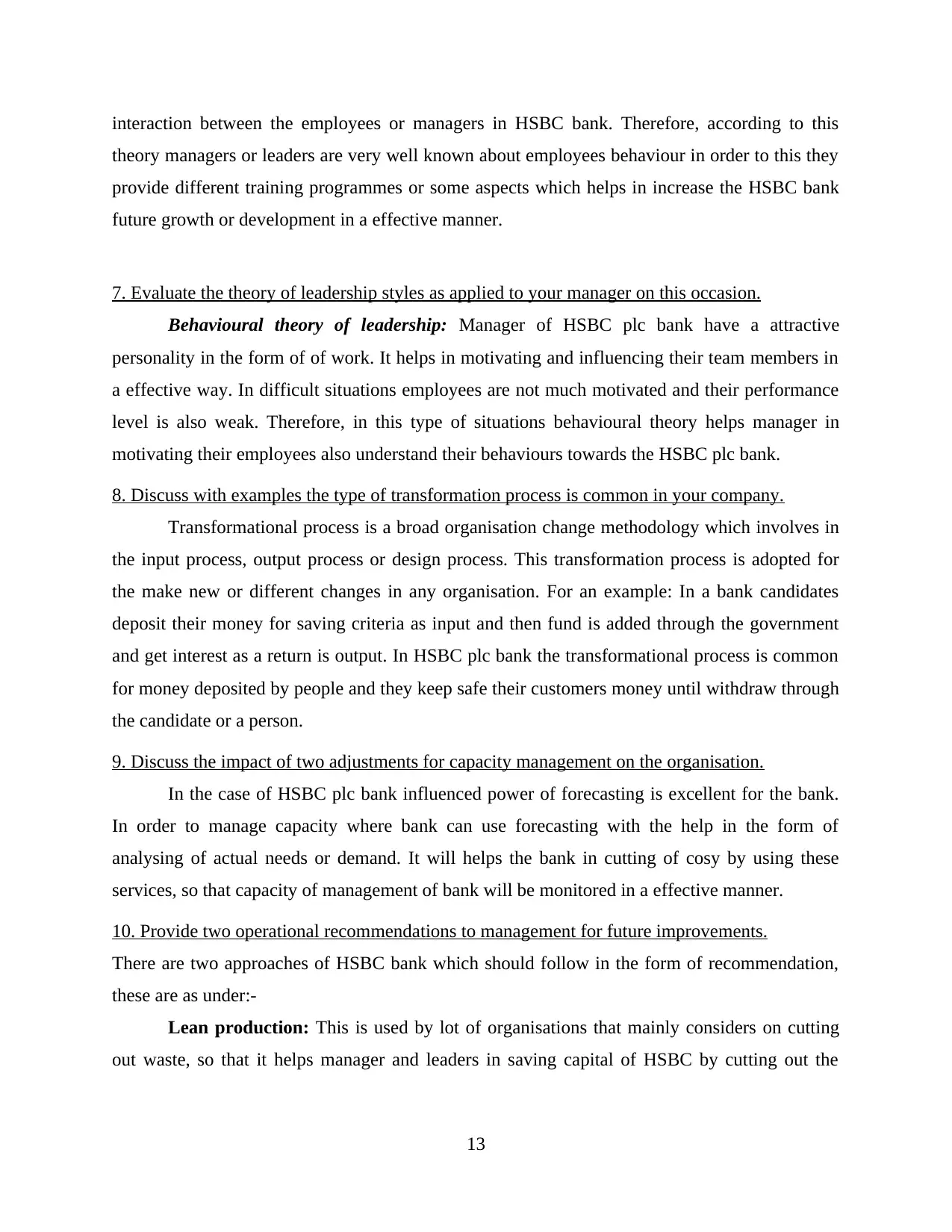
interaction between the employees or managers in HSBC bank. Therefore, according to this
theory managers or leaders are very well known about employees behaviour in order to this they
provide different training programmes or some aspects which helps in increase the HSBC bank
future growth or development in a effective manner.
7. Evaluate the theory of leadership styles as applied to your manager on this occasion.
Behavioural theory of leadership: Manager of HSBC plc bank have a attractive
personality in the form of of work. It helps in motivating and influencing their team members in
a effective way. In difficult situations employees are not much motivated and their performance
level is also weak. Therefore, in this type of situations behavioural theory helps manager in
motivating their employees also understand their behaviours towards the HSBC plc bank.
8. Discuss with examples the type of transformation process is common in your company.
Transformational process is a broad organisation change methodology which involves in
the input process, output process or design process. This transformation process is adopted for
the make new or different changes in any organisation. For an example: In a bank candidates
deposit their money for saving criteria as input and then fund is added through the government
and get interest as a return is output. In HSBC plc bank the transformational process is common
for money deposited by people and they keep safe their customers money until withdraw through
the candidate or a person.
9. Discuss the impact of two adjustments for capacity management on the organisation.
In the case of HSBC plc bank influenced power of forecasting is excellent for the bank.
In order to manage capacity where bank can use forecasting with the help in the form of
analysing of actual needs or demand. It will helps the bank in cutting of cosy by using these
services, so that capacity of management of bank will be monitored in a effective manner.
10. Provide two operational recommendations to management for future improvements.
There are two approaches of HSBC bank which should follow in the form of recommendation,
these are as under:-
Lean production: This is used by lot of organisations that mainly considers on cutting
out waste, so that it helps manager and leaders in saving capital of HSBC by cutting out the
13
theory managers or leaders are very well known about employees behaviour in order to this they
provide different training programmes or some aspects which helps in increase the HSBC bank
future growth or development in a effective manner.
7. Evaluate the theory of leadership styles as applied to your manager on this occasion.
Behavioural theory of leadership: Manager of HSBC plc bank have a attractive
personality in the form of of work. It helps in motivating and influencing their team members in
a effective way. In difficult situations employees are not much motivated and their performance
level is also weak. Therefore, in this type of situations behavioural theory helps manager in
motivating their employees also understand their behaviours towards the HSBC plc bank.
8. Discuss with examples the type of transformation process is common in your company.
Transformational process is a broad organisation change methodology which involves in
the input process, output process or design process. This transformation process is adopted for
the make new or different changes in any organisation. For an example: In a bank candidates
deposit their money for saving criteria as input and then fund is added through the government
and get interest as a return is output. In HSBC plc bank the transformational process is common
for money deposited by people and they keep safe their customers money until withdraw through
the candidate or a person.
9. Discuss the impact of two adjustments for capacity management on the organisation.
In the case of HSBC plc bank influenced power of forecasting is excellent for the bank.
In order to manage capacity where bank can use forecasting with the help in the form of
analysing of actual needs or demand. It will helps the bank in cutting of cosy by using these
services, so that capacity of management of bank will be monitored in a effective manner.
10. Provide two operational recommendations to management for future improvements.
There are two approaches of HSBC bank which should follow in the form of recommendation,
these are as under:-
Lean production: This is used by lot of organisations that mainly considers on cutting
out waste, so that it helps manager and leaders in saving capital of HSBC by cutting out the
13
Secure Best Marks with AI Grader
Need help grading? Try our AI Grader for instant feedback on your assignments.
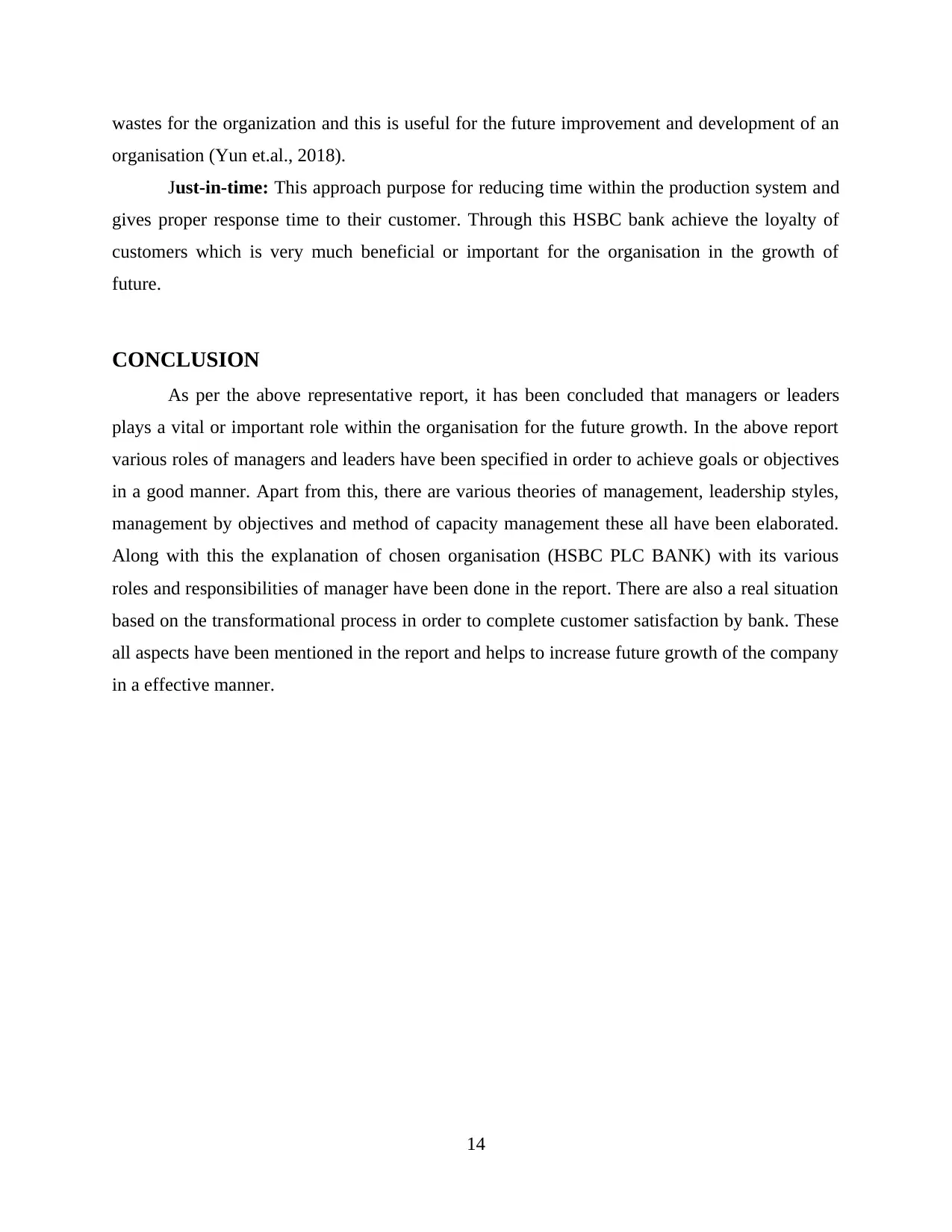
wastes for the organization and this is useful for the future improvement and development of an
organisation (Yun et.al., 2018).
Just-in-time: This approach purpose for reducing time within the production system and
gives proper response time to their customer. Through this HSBC bank achieve the loyalty of
customers which is very much beneficial or important for the organisation in the growth of
future.
CONCLUSION
As per the above representative report, it has been concluded that managers or leaders
plays a vital or important role within the organisation for the future growth. In the above report
various roles of managers and leaders have been specified in order to achieve goals or objectives
in a good manner. Apart from this, there are various theories of management, leadership styles,
management by objectives and method of capacity management these all have been elaborated.
Along with this the explanation of chosen organisation (HSBC PLC BANK) with its various
roles and responsibilities of manager have been done in the report. There are also a real situation
based on the transformational process in order to complete customer satisfaction by bank. These
all aspects have been mentioned in the report and helps to increase future growth of the company
in a effective manner.
14
organisation (Yun et.al., 2018).
Just-in-time: This approach purpose for reducing time within the production system and
gives proper response time to their customer. Through this HSBC bank achieve the loyalty of
customers which is very much beneficial or important for the organisation in the growth of
future.
CONCLUSION
As per the above representative report, it has been concluded that managers or leaders
plays a vital or important role within the organisation for the future growth. In the above report
various roles of managers and leaders have been specified in order to achieve goals or objectives
in a good manner. Apart from this, there are various theories of management, leadership styles,
management by objectives and method of capacity management these all have been elaborated.
Along with this the explanation of chosen organisation (HSBC PLC BANK) with its various
roles and responsibilities of manager have been done in the report. There are also a real situation
based on the transformational process in order to complete customer satisfaction by bank. These
all aspects have been mentioned in the report and helps to increase future growth of the company
in a effective manner.
14
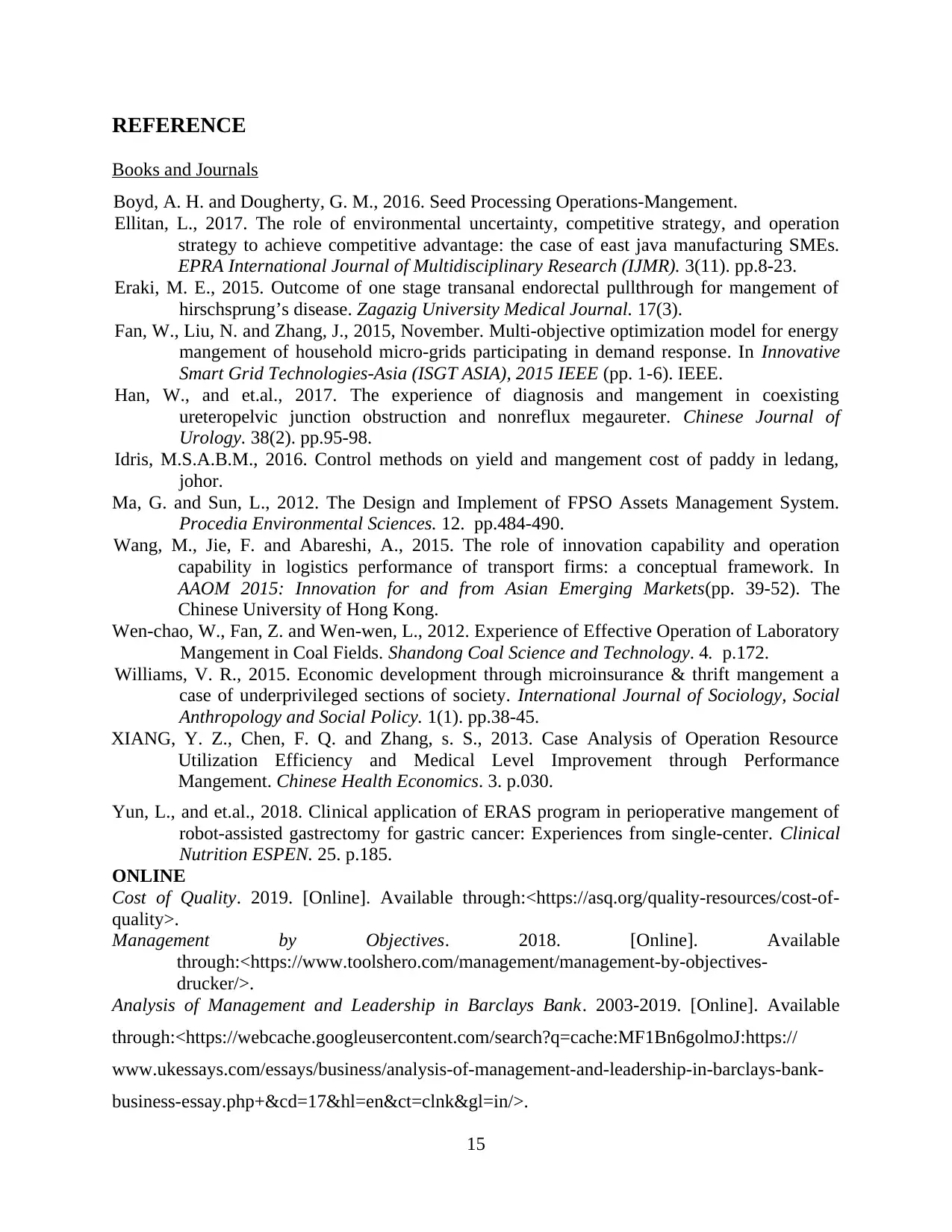
REFERENCE
Books and Journals
Boyd, A. H. and Dougherty, G. M., 2016. Seed Processing Operations-Mangement.
Ellitan, L., 2017. The role of environmental uncertainty, competitive strategy, and operation
strategy to achieve competitive advantage: the case of east java manufacturing SMEs.
EPRA International Journal of Multidisciplinary Research (IJMR). 3(11). pp.8-23.
Eraki, M. E., 2015. Outcome of one stage transanal endorectal pullthrough for mangement of
hirschsprung’s disease. Zagazig University Medical Journal. 17(3).
Fan, W., Liu, N. and Zhang, J., 2015, November. Multi-objective optimization model for energy
mangement of household micro-grids participating in demand response. In Innovative
Smart Grid Technologies-Asia (ISGT ASIA), 2015 IEEE (pp. 1-6). IEEE.
Han, W., and et.al., 2017. The experience of diagnosis and mangement in coexisting
ureteropelvic junction obstruction and nonreflux megaureter. Chinese Journal of
Urology. 38(2). pp.95-98.
Idris, M.S.A.B.M., 2016. Control methods on yield and mangement cost of paddy in ledang,
johor.
Ma, G. and Sun, L., 2012. The Design and Implement of FPSO Assets Management System.
Procedia Environmental Sciences. 12. pp.484-490.
Wang, M., Jie, F. and Abareshi, A., 2015. The role of innovation capability and operation
capability in logistics performance of transport firms: a conceptual framework. In
AAOM 2015: Innovation for and from Asian Emerging Markets(pp. 39-52). The
Chinese University of Hong Kong.
Wen-chao, W., Fan, Z. and Wen-wen, L., 2012. Experience of Effective Operation of Laboratory
Mangement in Coal Fields. Shandong Coal Science and Technology. 4. p.172.
Williams, V. R., 2015. Economic development through microinsurance & thrift mangement a
case of underprivileged sections of society. International Journal of Sociology, Social
Anthropology and Social Policy. 1(1). pp.38-45.
XIANG, Y. Z., Chen, F. Q. and Zhang, s. S., 2013. Case Analysis of Operation Resource
Utilization Efficiency and Medical Level Improvement through Performance
Mangement. Chinese Health Economics. 3. p.030.
Yun, L., and et.al., 2018. Clinical application of ERAS program in perioperative mangement of
robot-assisted gastrectomy for gastric cancer: Experiences from single-center. Clinical
Nutrition ESPEN. 25. p.185.
ONLINE
Cost of Quality. 2019. [Online]. Available through:<https://asq.org/quality-resources/cost-of-
quality>.
Management by Objectives. 2018. [Online]. Available
through:<https://www.toolshero.com/management/management-by-objectives-
drucker/>.
Analysis of Management and Leadership in Barclays Bank. 2003-2019. [Online]. Available
through:<https://webcache.googleusercontent.com/search?q=cache:MF1Bn6golmoJ:https://
www.ukessays.com/essays/business/analysis-of-management-and-leadership-in-barclays-bank-
business-essay.php+&cd=17&hl=en&ct=clnk&gl=in/>.
15
Books and Journals
Boyd, A. H. and Dougherty, G. M., 2016. Seed Processing Operations-Mangement.
Ellitan, L., 2017. The role of environmental uncertainty, competitive strategy, and operation
strategy to achieve competitive advantage: the case of east java manufacturing SMEs.
EPRA International Journal of Multidisciplinary Research (IJMR). 3(11). pp.8-23.
Eraki, M. E., 2015. Outcome of one stage transanal endorectal pullthrough for mangement of
hirschsprung’s disease. Zagazig University Medical Journal. 17(3).
Fan, W., Liu, N. and Zhang, J., 2015, November. Multi-objective optimization model for energy
mangement of household micro-grids participating in demand response. In Innovative
Smart Grid Technologies-Asia (ISGT ASIA), 2015 IEEE (pp. 1-6). IEEE.
Han, W., and et.al., 2017. The experience of diagnosis and mangement in coexisting
ureteropelvic junction obstruction and nonreflux megaureter. Chinese Journal of
Urology. 38(2). pp.95-98.
Idris, M.S.A.B.M., 2016. Control methods on yield and mangement cost of paddy in ledang,
johor.
Ma, G. and Sun, L., 2012. The Design and Implement of FPSO Assets Management System.
Procedia Environmental Sciences. 12. pp.484-490.
Wang, M., Jie, F. and Abareshi, A., 2015. The role of innovation capability and operation
capability in logistics performance of transport firms: a conceptual framework. In
AAOM 2015: Innovation for and from Asian Emerging Markets(pp. 39-52). The
Chinese University of Hong Kong.
Wen-chao, W., Fan, Z. and Wen-wen, L., 2012. Experience of Effective Operation of Laboratory
Mangement in Coal Fields. Shandong Coal Science and Technology. 4. p.172.
Williams, V. R., 2015. Economic development through microinsurance & thrift mangement a
case of underprivileged sections of society. International Journal of Sociology, Social
Anthropology and Social Policy. 1(1). pp.38-45.
XIANG, Y. Z., Chen, F. Q. and Zhang, s. S., 2013. Case Analysis of Operation Resource
Utilization Efficiency and Medical Level Improvement through Performance
Mangement. Chinese Health Economics. 3. p.030.
Yun, L., and et.al., 2018. Clinical application of ERAS program in perioperative mangement of
robot-assisted gastrectomy for gastric cancer: Experiences from single-center. Clinical
Nutrition ESPEN. 25. p.185.
ONLINE
Cost of Quality. 2019. [Online]. Available through:<https://asq.org/quality-resources/cost-of-
quality>.
Management by Objectives. 2018. [Online]. Available
through:<https://www.toolshero.com/management/management-by-objectives-
drucker/>.
Analysis of Management and Leadership in Barclays Bank. 2003-2019. [Online]. Available
through:<https://webcache.googleusercontent.com/search?q=cache:MF1Bn6golmoJ:https://
www.ukessays.com/essays/business/analysis-of-management-and-leadership-in-barclays-bank-
business-essay.php+&cd=17&hl=en&ct=clnk&gl=in/>.
15
1 out of 18
Related Documents
Your All-in-One AI-Powered Toolkit for Academic Success.
+13062052269
info@desklib.com
Available 24*7 on WhatsApp / Email
![[object Object]](/_next/static/media/star-bottom.7253800d.svg)
Unlock your academic potential
© 2024 | Zucol Services PVT LTD | All rights reserved.





